#what defines her as a character is not that she was Born To Save The Doctor its that she thinks like this
Text
The Marvels is being scathed by critics, and that's a good thing.
I finally saw The Marvels today. I'm a bit late to the party, so all I saw about the movie was the teaser at the end of Ms Marvel, and way too many critical reviews of it.
Now, obviously on Tumblr you find the good reviews, like, the cats outnumbering the white men and how Kamala Khan is, like, basically all of us. But in person, I've had someone tell me that it's bad because Rotten Tomatoes rates it 43%, which-- besides wondering why anyone would listen to Rotten Tomatoes, I'd have to wonder why the website would give it such a low rating. The easy answer is that the Tomatoes review committee is populated by white men, who, upon having no one to relate to, react badly to the movie. But I think there's more to it.
The Marvels is a revolution. Through its character-driven writing and brazen exploration of morality, it rewrites the superhero formula completely, by questioning what exactly it means to be a superhero.
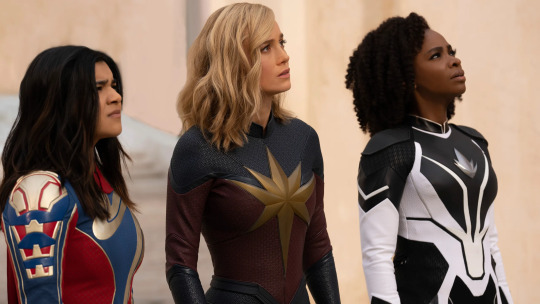
The Marvels was directed by Nia DaCosta, an award-winning Harlem native and creative visionary whose approach to this film was to define these characters as humans, not as superheroes. Her approach to heroism directly addresses that the idea that a hero is not always right. A hero, DaCosta claims, is "someone who's trying their best with the information and tools they have at the time. They'll always get it wrong." Carol Danvers's arc directly addresses this, as the resolution of her subplot involves her re-igniting the sun that she snuffed out. Her heroic act is to undo the damage that she wrought.

When compared to old Marvel, this message just doesn't come through. In WandaVision, Wanda's grief is for a family that was killed by the Avengers. Yet, she is painted as a villain, even as she searches for a happy home, even as she at one point joins the Avengers. The Avengers cannot undo what they did, and don't really try. They defeat the big bad, sacrifice their lives, but nothing brings back Wanda's family. Nothing undoes that war. No one searches for Wanda after the event, to try to help her with her grief, except for Monica, and she's working against orders. Their heroics are militant, but while they excel at destruction, they leave the people they hurt in the dust.
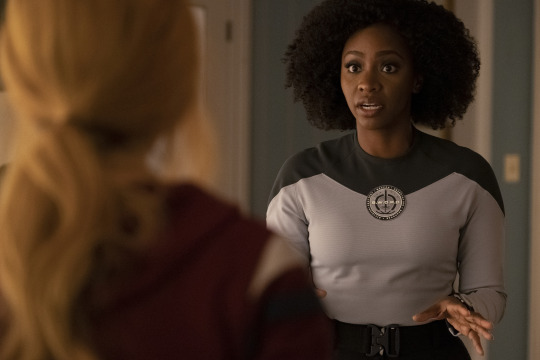
This antiheroic plot of old Marvel is precisely what appealed to so many American audiences. Their protagonists are: a rich corporation, a super-soldier, a privileged teenager, a scientist who makes weapons, an ex-convict, a man born into godlike power, and I'm sure there are others but I don't actually care that much... (these would be iron man, captain america, peter parker spiderman, hulk, antman, thor, and etc). All these archetypes appeal to American ideals that the wealthy would sympathize with. They claim that there are people who are inherently bad and seek the power that they have, in the way that a poor person might want a job that a wealthy person wants their child to secure. They claim that it is their business to save those which cannot save themselves, and use this to get involved in wars that are not theirs, and beat up badguys whose backstory they have no way of knowing-- and they punch before they stop and listen.
They are cops in every sense of the word. The responsibility of the vigilante is to defend against evil, but part of that responsibility is to figure out who exactly is evil and who is in need of help.
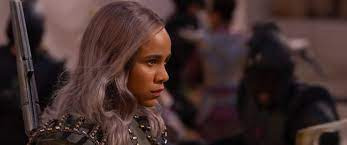
The Marvels creates a team that tries to distinguish evil from good, and delves into the grey area between them. The final battle between Carol Danvers and Dar-benn has the superhero pinning the grey-haired antagonist to the ground as she begs for, then demands, that Carol fix what she damaged. Monica urges her to listen. Through this, The Marvels argues that a hero does not always beat up the bad guy and fight against unrelenting evil, but that a hero can be wrong, and that a hero can reconsider. It's kindness in the way that is revolutionary, where it's much easier to choose cruelty.
The fact that the movie is getting torn apart by critics, then, is not just because it is a "girls movie" or it doesn't have a strong white man for the white male viewer to sympathize with. The Marvels cannot appeal to Marvel fans because it rewrites the genre itself. It takes a film series whose purpose was to depict the struggles of cops, of the wealthy, of people with too much power who are trying to learn how to responsibly wield it, but don't. And it gives that power to people who have watched superheroes try and fail, who are slowly learning to be better heroes than the ones before them.
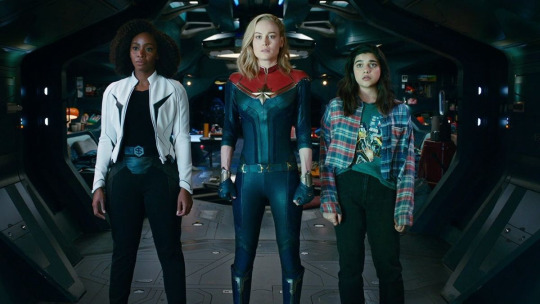
The next generation is a critique of the last, a group trying not to make the mistakes of the chosen ones that came before them, and as such, the movie exists to critique the movies that came before it. Therefore, a viewer of Marvel who would positively review it, due to sympathizing with the previous heroes and enjoying the power fantasy, would dislike it out of its existence being critical and contradictory to the films they like themselves.
The Marvels is not for Marvel fans-- at least, not those who saw the Avengers as purely heroes. Instead, the film reaches out to people who would have been against the old Avengers, who want a story that dismantles the unquestioned idealism of superheroes and writes about people trying to protect their communities and the people they care about.
So, let the critics complain. The MCU is shedding its roots as a pro-cop and pro-colonialism power fantasy, and evolving into an exploration of what it means to be a true hero.
#the marvels#ms marvel#captain marvel#photon#kamala khan#monica rambeau#carol danvers#.pyro#pyro.txt#the marvels analysis#can you tell that i loved this movie#it's been so long since i've done an analysis but this one SPOKE to me#anyways i'm coming from the perspective of a marvel hater until i watched ms marvel#honestly i just put the images in there to break it up. they are not very relevant. i didn't pirate so i don't have good screenshots
300 notes
·
View notes
Note
tawnypelt honor title pleeeease she deserves it tigerstars daughter with the burden of a million expectations on her but who who has always adamantly gone her own way. maybe tawnysun or tawnydusk. also, whats her relationship with mothwing like? in the books their heritage as tigerkin was super neglected (misogyny) but it ended up creating two very indepentent characters who defined themselves outside of their fathers, unluke hawk and bramble who never could
I wish I could justify a four-tiger pileup at the Snare Scene, but it would change the events waaay too much to stay in the spirit of BB. Like, have it somehow be Tawnypelt who was targeted for ultimately rejecting her father so she's in the trap, somehow this would give Brambleclaw power or expose him so he hesitates, Mothwing jumps in to save Tawnypelt, Hawk and Bramble fight, and then Hawkfrost impales himself on the stake Mothwing is holding.
Especially since BB!TNP is now from the perspective of the Tigerkin-only. It would be really cool for it to be the ultimate confrontation between the four tiger cubs.
But, it is what it is.
I wish there was more space to explore a Tawnypelt/Mothwing dynamic, but I think there's a reason beyond just misogyny tbf (tho it is also present). When you have two half-siblings who reject their shared dad, what really connects you?
Nothing. I've seen it irl too. People don't like to hear this, but family IS a choice. The associations and expectations put on you because of your family aren't, and WHO you are born TO isn't a choice. But whenever your family comes to support you, every instance where you stand with them through hardship, the monumental task of being there for each other, time after time, IS A CHOICE.
It always has been.
When Brambleclaw learned that Hawkfrost was only connected to him through his bloodline, even after (canonically) being told Hawk never faced the same discrimination he did, he was CHOOSING to act as his brother. He was CHOOSING to accept that Tigerstar is something to unite over.
Tawnypelt and Mothwing don't. Nothing makes them sisters besides a man that one of them never even met.
Now dgmw. I don't think the Erins believe this, they're obsessed with magical, innate blood emotions. I think they didn't explore Tawny and Moth because they care less about girls, bottom line.
But I think this is why it wouldn't really make sense if they tried. And it's something I'd say on purpose if I had the chance.
#better bones au#bone babble#BB!TNP#Anyway yeah Tawnydusk... perhaps. I feel like Sunset is such a fascinating word to use though#Very honor titley
98 notes
·
View notes
Text
Unpopular opinion but......
Am I the only one who misses the og marauders? The marauders fandom isn't even about the marauders now, 99% of their canon personality traits hv been replaced with cliqued behaviour. For some reason there's a massive obsession with their sexuality and I just don't get it? Lyk can't u have a character with any sexual orientation with personality traits outside it anymore? Does there really need to be a complete erasure of their most defining traits? I just wish we could get the actual marauders era characters back
James Potter: Pureblood, rich, intelligent, arrogant, a bully, but extremely loyal; took Sirius in and turned into an animagus for his werewolf bestie when the whole world would have shunned him; he could have led a life of utmost comfort but chose to risk his life and fight for those he loved in a war that didn't even concern him personally. His last words were asking his wife and child to escape while he tried to hold voldy off without a wand
Sirius Black: Haughty, a bully, extremely good looking, cool, rich, blood traitor by 16, comes from a family of literal death eaters, very intelligent, loyal, will do anything for those he loves( especially james and later Harry), thick as hell (my boy really survived in a depression prison for 12yrs, tht too after all the horror he'd seen before that), dark, very traumatized and broken
Remus Lupin: Gentle (yup u read that right), kind, mischievous (ppl really overlook this), very insecure, let james and Sirius bully Snape coz he was too thankful for their acceptance and affection to tell them off, considered himself undeserving of love, his self loathing prevents him from being a responsible adult/ parent for Harry, lowkey manipulative. Very compassionate and empathetic even after everything he's been thru tho
Peter Pettigrew: Considered slow and stupid, insecure, tags along with the others for protection, but obviously cunning and manipulative, a disgusting rat tho
Regulus Black: Teenage Reggie worshipped death eaters, he had newspaper clippings of them on his wall, completely believed in those racist ideologies until he realised what the reality of being a death eater was. He tried to bring voldy down but there's no evidence of him completely changing his beliefs about everything else like muggle borns, muggles, werewolves etc. Very cunning and intelligent tho, he discovered voldemort's secret before Dumbledore did. Liked kreacher but kreacher was also brainwashed with pureblood ideology, so I ll only give him half the credit. Bravely sacrificed his life in the end, but he still chose to protect his racist family.
Lily Evans: muggleborn, good at portions, described as popular and vivacious, pretty, the favourite sibling, isn't afraid of standing up to ppl (tht smirk in swm tho?), very brave, and most importantly (ppl really choose to forget this nowadays) a mother who stood in front of her baby boy in hopes of saving him from the darkest wizard alive even tho she herself was only 21 at the time, tht too right after losing her husband. Tho I'd still say that lily is a badly written character
It's fun to explore characters but not one of these core characteristics r even present. They're turned into one dimensional social justice warriors who r always right in everything they do
Now I get it, ppl want them to fit with current day ideals, but y not just create different/new characters then? What's the point of holding on to that nostalgia if most of their character isn't even there anymore? Where's all the toxicity coming from? And anyone who doesn't agree is homophobic and whatever other -phobic u choose to employ in the most irrelevant context ever. It's all so stupid smh🙄
#harry potter#james potter#sirius black#remus lupin#peter pettigrew#regulus black#lily evens#marauders era#mauraders#anti fanon#anti marauders#pro james potter#pro sirius black#pro remus lupin#pro lily evans#pro regulus black#pro sirius
173 notes
·
View notes
Text
Meta: Timerra and Tellius
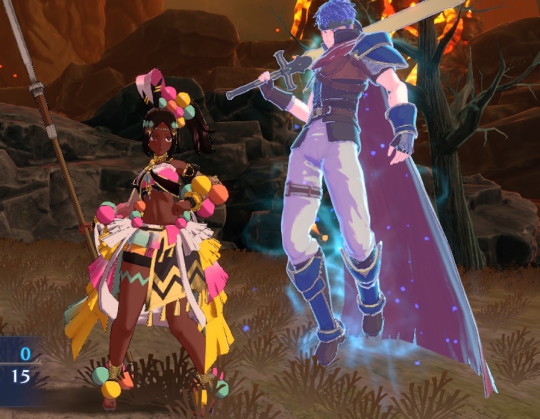
Timerra’s (belated) birthday gives me an excuse to talk about one of my favorite Engage topics: the parallels between her and various Tellius characters.
(Spoilers for FE9/10 and FE17.)
The obvious place to start is Ike. As Timerra’s personal Emblem, his build and paralogue in Engage focus on turning defense into offense to endure and protect others. This synergizes with Timerra’s Sandstorm ability as well as her priorities as Solm’s future queen.
Compared to other Emblem summonings in the game, the scene where Ike is summoned is quick and to-the-point. The Solm royals are highly competent, with a wide spy network, and already had a plan in place for when Alear shows up. They have a healthy wariness they don’t immediately display, as they welcome Alear with open arms while secretly testing if they are the true Divine Dragon. By the time Timerra meets Alear, their identity has been confirmed and bandits are already attacking, so she jumps straight into action to get Ike’s help and protect the village.
I’m sure Ike would approve of her no-nonsense approach and her focus on keeping people safe, especially after all of his own bandit fights. He has no patience for bureaucracy or noble trappings, but he understands the need for discretion when danger and politics are involved (see: his own ‘sometimes you have to fool your allies’ maneuver in RD part 2), so I think he would appreciate how the Solm royals handle this.
But you don’t have to take my word for that. Between Timerra and Seforia saying they always wanted to meet him, Timerra calling him family, Ike telling Fogado that Solm castle reminded him of being with the mercenaries, and his first Somniel dialogue saying that he already misses Solm, I think it’s safe to say there’s a lot of natural fondness between Ike and the Solm royals. Is there any wonder, when one of Solm’s main norms is accepting people regardless of their origins, possibly Ike’s defining ideal?
My favorite example of this is when Alear’s origins are revealed, and Timerra and Fogado have some of the most affirming reactions:
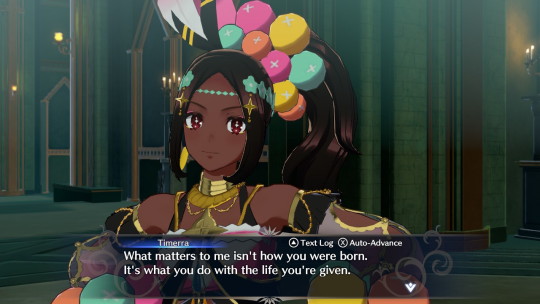
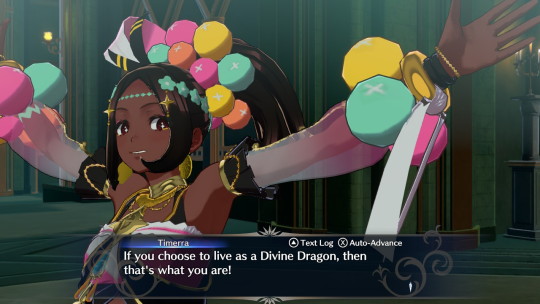
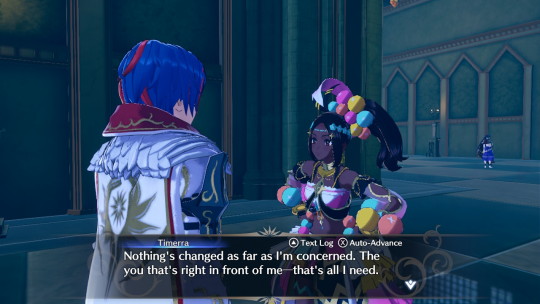

[ID: Four screencaps with the following dialogue toward Alear:
Timerra: What matters to me isn’t how you were born. It’s what you do with the life you’re given.
Timerra: If you choose to live as a Divine Dragon, then that’s what you are!
Timerra: Nothing’s changed as far as I’m concerned. The you that’s in front of me—that’s all I need.
Fogado: The people of Solm don’t care about origins. We care about the you NOW. And you are amazing.]
This aspect of Timerra shines throughout her supports, most notably in her relationships with Merrin and Panette. Their love and loyalty toward her stems from a time before they even knew she was a princess. They both see her as a beacon in their lives, as they wished to escape the confines of their pasts and find new futures for themselves. Timerra saw them for their ideal versions of themselves—Merrin as a chivalrous knight, Panette as someone who isn’t caught in a destructive cycle—rather than the situations they came from. Her acceptance helped them create those realities for themselves.
Anyway, unrelated to the above, just a completely random pair of images that don’t make me cry at all:


[ID: In a screencap from Engage, Timerra is saying, “No matter what’s happened, you’re still you. Let’s go save the world, Ike!” In a screencap from Path of Radiance, Ike is telling Soren, “No. It doesn’t change anything. You’re still you, Soren!”]
Another example is Timerra’s attitude toward Veyle. In the main plot, she’s one of the few main characters to express distrust toward Veyle even after the truth is revealed. However, once Veyle has proven herself as an ally, Timerra is extremely friendly toward her in their supports, with Veyle appreciating how Timerra treats her like any other friend rather than a Fell Dragon’s daughter. Again, this is reminiscent of Ike’s blend of skepticism and treating everyone the same.
I think it’s also interesting that Timerra struggles with conflicting desires for freedom vs. connection, as shown in her S support. Despite Ike’s love for people, he doesn’t always deal well with the responsibilities and expectations that get placed on him, and his ending shows he shares some of her wanderlust.
Timerra: When we connect with people─you know, really bond with them─those bonds make us stronger.
Timerra: I mean, our closest allies help us do things we could never do all by ourselves.
Timerra: That’s powerful stuff. But those bonds─those friendships─can feel like obligations too.
Finally, one of my favorite parallels between Ike and Timerra is a shared charm point: the fact that they live as they please, regardless of what others think, while also acting like everything they do is super obvious. An extremely ‘have your cake and eat it too’ mentality that I can only respect.
Alear: Still, you never cease to amaze. You take it upon yourself to help root out bandits…
Timerra: What, is that not normal?
Timerra: I’m just protecting my people. I thought that’s what royalty was supposed to do.
Alear: You say something completely radical like it’s the most obvious thing in the world.
Timerra: Hahaha! That’s my charm!
Ranulf: Well…a little crazy, yeah! I’ve never worked for a leader who’s as blunt and straightforward as you. It’s pretty shocking to have a commander who doesn’t care what anyone thinks, no matter how powerful they are.
Ike: Well, that’s just my style. I don’t have to be like someone else, do I?
Ranulf: Why are you so confident? I don’t get it. Normal beorc just do what people tell them and try not to make a fuss. But not you. I heard you even yelled at the apostle!
Ike: Yeah, that wasn’t my brightest moment.
Ranulf: Then again, worrying about a beorc like this is definitely not normal laguz behavior. I guess I’m a fish out of water myself… Wait, did I just call myself a fish?
Ike: Wha–? Ha ha! You’re a cat, remember!? I thought you ate fish. Ha ha ha!
Okay, that last bit isn’t relevant, but I just want to highlight that while Timerra and Fogado talk about how serious Ike is compared to them, they would definitely enjoy his secret love of bad puns. Here’s a bit of Timerra’s own sardonic humor that brings Ike to mind:
Alear: What?! How do you eat that much?!
Timerra: Oh, you know. Open my mouth, bite, chew. I won’t bore you with all the details.
Of course I have to mention their love of meat, even if I don’t find that to be an important part of Ike’s character. What I will say is that Ike is shown in his supports with Oscar to have a genuine appreciation for artful cooking, so I think it’s neat that Timerra is one of the best cooks in the army. It’s also endearing that she feels bad for cooking around Ike when he can’t eat, though he tells Fogado the smell is enough.
Next, I want to talk about a couple of characters who aren’t in Engage: Mist and Elincia. I adore that the focus on Timerra protecting Ike flips his dynamic with both of these ladies on its head. Speaking of protection…I believe that Mist and Ike’s relationship mirrors Timerra and Fogado’s, with their fond, casual banter. It makes sense, since both duos are close in age.
Interestingly, despite Timerra being Fogado’s older sister, he is as protective of her as Ike is toward Mist. In Fogado’s case, he seems to almost see himself as Timerra’s retainer, given that he will one day be her advisor. He travels around to prepare himself for this role. Timerra, however, doesn’t always like this, as she wishes they could hang out more and that he would be more candid with her. While they’re clearly close, the distance still leaves her lonely.
Though it’s a different situation, Greil’s death puts Ike in the role of Mist’s protector at the same time that he gains dangerous responsibilities. He also takes it upon himself to get revenge on their father’s killer. She stresses that she does not want him to do these things if it means she’ll lose him, too, and as the game goes on, they lose some of the lighthearted dynamic they had at the game’s start. Having already lost her parents, it’s easy to assume Mist feels lonely in this circumstance. She even has her own protective streak toward Ike, such as in her battle conversations with the Black Knight and Ashnard. Like Timerra, Mist wants to stay close to her loved ones and protect them, and she joins the fighting to that end, even learning swordplay despite being a healer.
Despite their troubles, Mist and Timerra share a bubbly personality. They tend toward optimism and try to hide their cares them. Their sunniness gets them and others through tough situations. However, those around them still want to be able to support them even when struggle with being vulnerable.
In my opinion, some of Mist’s designs evoke Timerra’s, such as in the colors and flowing accessories. While the clothes aren’t super similar, I think the two of them would definitely enjoy going clothes shopping together. I also think they’d like to sing together. Timerra’s silly songs may be a far cry from the galdr that Mist and Elena safeguard, but that would suit Mist just fine.
Possibly my favorite character to compare Timerra to, though, is Elincia. Timerra’s bangs and the fact that her hair is tied up even follow in the character design traditions of Elincia and other characters in her archetype, such as Nyna and Guinevere. Granted, Timerra’s ponytail is a lot looser than those other characters, which is an excellent design choice as she has a much more free-spirited personality.
Still, Elincia once upon a time was not so different. She grew up in secret, frolicking in the countryside with no expectation of becoming queen. As a result, she did many things most princesses didn’t do, such as chores, horseback riding, and sword fighting. It’s commented many times that due to cultural differences as well as Timerra’s own personality, her lifestyle and activities are often at odds with what others expect from a princess. While their allies might find both princesses strange at times, they end up trusting and supporting them due to their approachable natures.
Elincia is shown to have a playful streak in PoR when she is reunited with her retainers, around whom she feels comfortable enough to drop her more stately personality. On the flip side, while Timerra is more frequently playful, she never forgets her role. Even her more casual supports show this, such as when she susses out Ivy’s weakness during a camping trip, or interrupts a training session with Diamant to ask if he believes peace is possible. Many of her exploration quotes show this as well, with her referencing the other nations’ politics and even in her response if her allies die.
“My brother, my stewards…gone. It’s so cruel. But as the future queen, I will not crumble!”
Elincia and Timerra’s upbringings contrast with each other, since Timerra has always known she would be queen. Her free-spirited nature stems from Solm’s ideals and the role of its government. After Daein invades, Elincia has to travel incognito, giving her a chance to learn about the world. She develops a strong desire to protect her people. The endpoint of her character development in PoR is where Timerra is already at when we are introduced to her—Timerra has been training and traveling incognito and is ready to defend her country. Regardless of where they start, Elincia’s compassion and resolve are reflected in Timerra, who only wants to make her people happy and believes the best way to do that is to get to know them, so she can better understand and protect them.
The games’ plots present challenges that test both characters’ resolve. While Elincia has to make a variety of decisions, the one I want to highlight comes at the end of RD part 2, when Lucia is taken hostage. Elincia is told that Lucia will die unless she gives up the throne to a usurper. However, she refuses. Despite the sacrifice of someone dear to her, she will never give up on protecting Crimea. In the end, both Lucia and Crimea are safe, but it has nonetheless been demonstrated what Elincia would do under that pressure.
I thought of this when I got to one of my favorite moments in Engage, when Timerra and co. have to take back the palace from the Elusians. Hortensia holds her mother hostage, assuming Timerra will bend and hand over the Emblem rings. However, doing so would doom Solm along with the rest of the world. Timerra refuses to back down, and she saves her family along with her country.
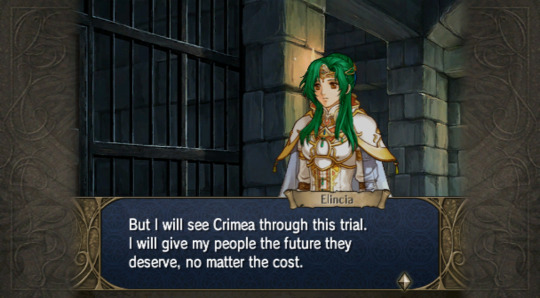




[ID: Five screencaps alternating between RD and Engage. Elincia and Timerra look resolved, while Lucia and Seforia as hostages look on proudly.
Elincia: But I will see Crimea through this trial. I will give my people the future they deserve, no matter the cost.
Timerra: So threaten us all you want. Take my whole family hostage, if it makes you happy.
Timerra: But I stand for Solm, and I always will.
Lucia: People of Crimea... Behold a true queen! YOUR queen! Long live Queen Elincia!
Seforia: There she is, the future queen of Solm. And her ally, the Divine Dragon.]
Back to characters who are in Engage: the other Tellius Emblems. As with Elincia, Micaiah is presented with a series of trolley problems throughout RD. There’s a big focus in the Tellius games on making decisions for personal vs. political reasons, and whether to prioritize a loved one/a situation that is right in front of you over the bigger picture, and I think this is most complex with Micaiah’s story. This is highlighted when Sothe is held hostage and she is told to stand down to save him. This recalls the situation I already discussed with Timerra.
Like Timerra, Micaiah is a tactical thinker who has to foresee long-term plans as well as use strategic approaches in situations where she’s outnumbered. Micaiah ends RD as Daein’s queen, despite not being brought up for that role and having traveled in disguise, getting to know and love Daein’s people. Again, this fits with Timerra traveling around incognito and being passionate about protecting Solm.
Timerra expresses that Solm didn’t reach out for help when Sombron returned because they’d have to return other nations’ support when it was taking all of their efforts just to keep Solm safe. This brings to mind Micaiah’s conflicts, as she has to make difficult decisions to protect Daein from Begnion’s occupation and the blood pact, which sometimes involves rejecting outside help when a situation is too complicated, such as in her 3-13 battle talk with Ike.
Unfortunately, Emblem bond supports don’t have the scope for these sorts of complexities. However, I was tickled by the fact that Timerra invites Micaiah to sing with her, as a reference again to the Galdrs.
Speaking of bond supports…I don’t have anything deep to say about Timerra and Soren, but just look at how precious they are:
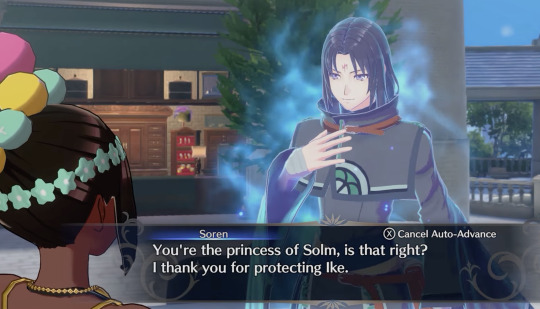
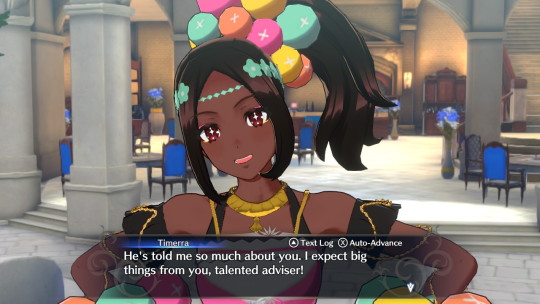
[ID: Two Emblem Bond screencaps. Soren is bowing with his hand over his heart, and he and Timerra are smiling at each other.
Soren: You’re the princess of Solm, is that right? I thank you for protecting Ike.
Timerra: He’s told me so much about you. I expect big things from you, talented advisor!]
Her careful approach to protecting Ike’s ring won the trust of someone with deep trust issues and a protective streak toward Ike, aww. They’re friends in my files every time. It’s also sweet that she wants to understand him and Ike better by learning about the mercenaries. I know she loves her moodier Emblem pals, but I’m sure she’d feel right at home with the whole rambunctious crew, like how Ike felt at home in Solm.
While this post is long enough without going into depth on Yunaka, as Micaiah’s guardian she also has a combination of Tellius influences, between her obvious parallels to Yune and Sothe as well as some of the themes of Micaiah’s character. Micaiah’s introduction, with her calling out to Yunaka, even mirrors Micaiah hearing Yune’s voice. For these reasons, I really wish she and Timerra had talked. I think Timerra’s simultaneous hidden wariness and acceptance of people regardless of their backgrounds would definitely play well with Yunaka’s arc. Fogado, as someone who shares Timerra’s ideals, certainly had a positive influence on Yunaka in their supports with his compassion. Plus, can you imagine the silly phrases Timerra and Yunaka would invent together?
I’ll end this before it strays too far from the main point, but I hope someone else enjoys these observations! Timerra is my favorite Engage character, and since Tellius is so dear to me, noticing these connections definitely made her character even more special.
#fire emblem#fe17#fe: engage#tellius#path of radiance#radiant dawn#timerra#timerra fire emblem#ike fire emblem#elincia ridell crimea#mist fire emblem#micaiah#soren fire emblem#yunaka#fogado#fe9#fe10#fire emblem engage
139 notes
·
View notes
Text
I don't know if this a hot take or not but I really disagree with the idea that Yukio is jealous of Rin's power and physical strength? Rather, I think it's Rin's emotional strength that Yukio envies.
I have a lot to say about this lmao, so I'm just gonna put it all under the cut that way people who don't want to read this long ass analysis don't have to. Also, manga spoilers.
Blue Exorcist is a fun shonen manga because it measures strength outside of just "how hard can i punch this dude." Often, when characters talk about getting strong, they're talking about wanting to be mentally resilient; they want the ability to persevere, to be independent and face their fears/emotional turmoil on their own. Shiemi is a good example of this, I think. She constantly talks about being strong, but usually in the context of naviagting the world after living so long in isolation, and struggling to support her friends. Yes, she wants to get physically stronger, but at the core, she just genuinely wants to have a strong spirit (like a weed), and to be emotionally strong enough to help carry her friends' burdens.
Now, back to Yukio.
The biggest reoccuring theme in Yukio's jealousy is how he puts his brother on a pedestal, while constantly downplaying every good thing about himself (they both do this lol). You'll see this a lot in the examples I bring up.
There are four scenes I really want to focus on when discussing just how Yukio defines strength: his flashback in Chapter 29, his inner monologue in Chapter 37, his suicide attempt in Chapter 93, and That Time He Shot Rin in the Head in Chapter 96.
In Chapter 29, Yukio has this five-page montage of flashbacks, depicting specific moments where he felt both admiration and envy for Rin. And each of these moments highlight Rin's empathy, his care-free behavior, his kindness, his ability to inspire others, his desire to protect his little brother. Not his habit of setting things on fire.
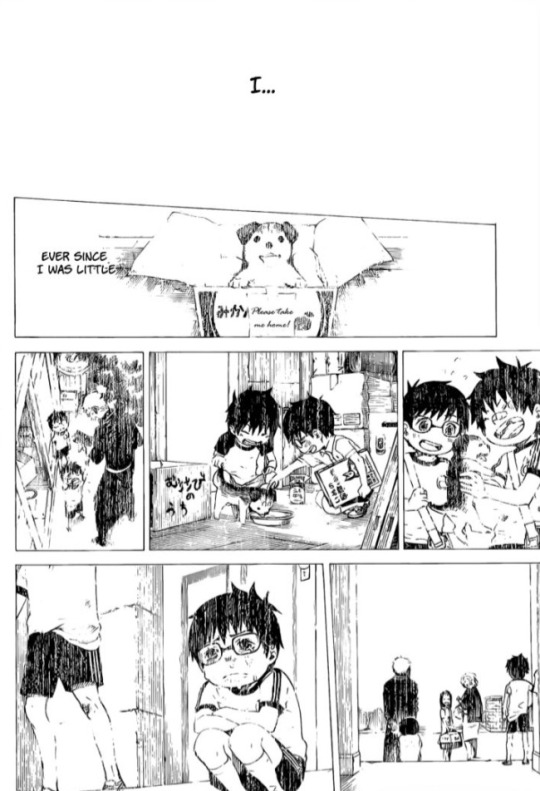
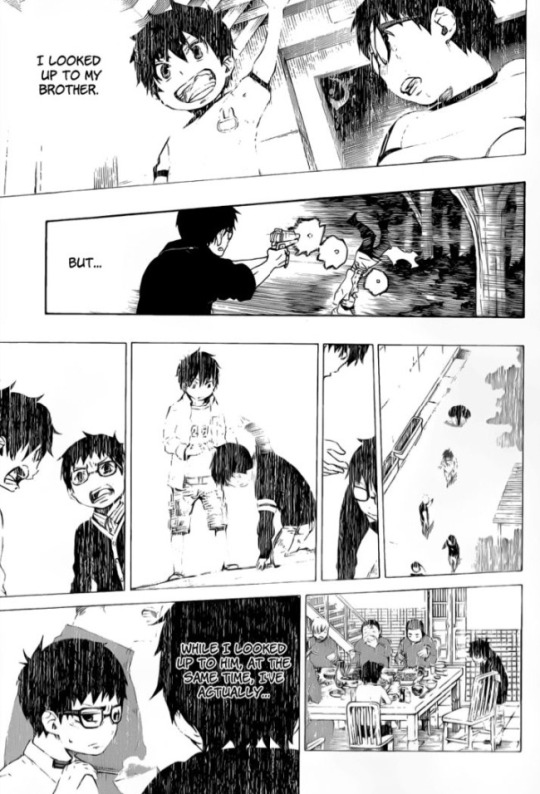
This is important because Yukio fundamentally believes that he is not a good person. He believes he is not kind, selfless, or brave. When he, as a child, cries because he can't adopt a puppy he wanted, he's envious that Rin is just happy to see the puppy in a nice home. When his brother rushes to save him from bullies, Yukio's upset that he couldn't do it on his own, that his brother feels he is so weak he can't even take care of himself.
From Yukio's perspective, these are examples of Rin either outshining him inherently or looking down on him. No matter how strong Yukio gets, he will never not be able to feel bad for himself when the puppy is given to a different family. He will never be able to prove to his brother that he can do things on his own. He was born with this weakness and he can't seem to kill it. He can't win, and he hates it.
In Chapter 37, after defeating the Kraken, Yukio and Rin have a little heart-to-heart. Here, we see Yukio's true feelings towards Rin's claims of "surpassing him", which is that Rin already does. Yukio feels that if anyone needs to surpass anyone, it's him. He will always come up short where it counts, whenever he needs to let things go or be more empathetic. Yukio is strong of body, but weak of spirit.
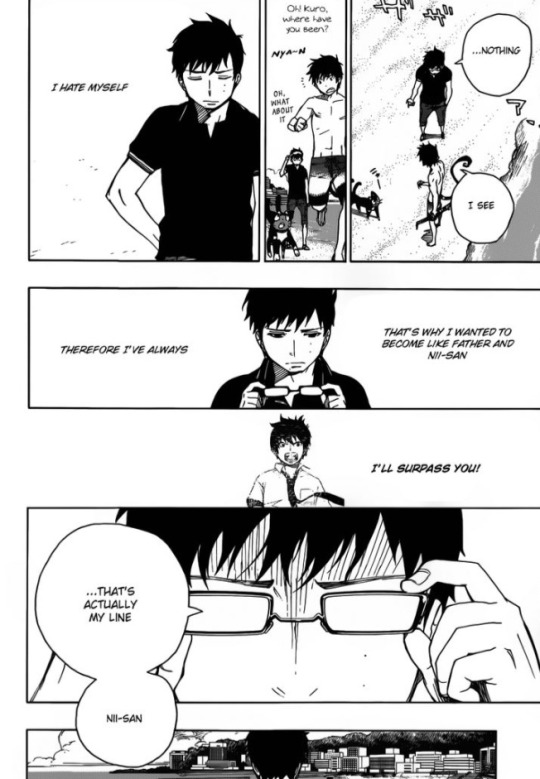

So, with this in mind, when Yukio falls to his knees in Chapter 93 and says, "I was weak, and I couldn't get any stronger," he doesn't mean, "damn. wish i could've harnessed the demon power in my eyes to blow shit up." No, he's admitting defeat. He tried so hard to be strong, both physically and mentally but especially mentally, and he failed. He couldn't carry burdens like his father and brother could, like his friends could. He was cruel and cowardly. He hurt people he loved, and as long as he continues to live, he will keep hurting the people he loves.
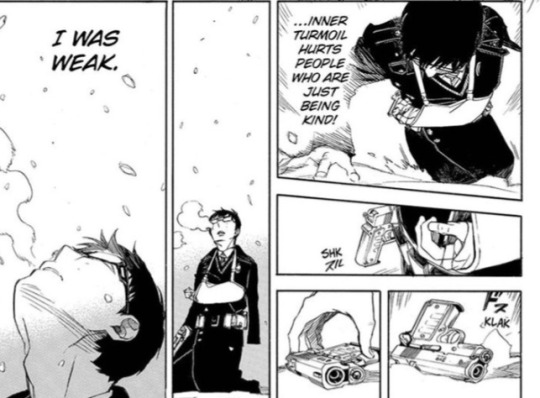
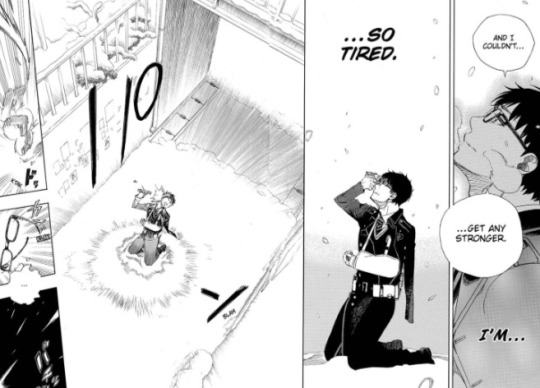
What is strength to Yukio? It's resilience. It's taking risks. It's independence. It's Rin.
(Or at least, how Yukio sees Rin. As I've said before, he likes to put Rin on a pedestal.)
In contrast, weakness is cowering. It's waiting for someone else to solve the problem. It's hurting good people who haven't faulted you. It's Yukio.
That leads us to Chapter 96, and this---

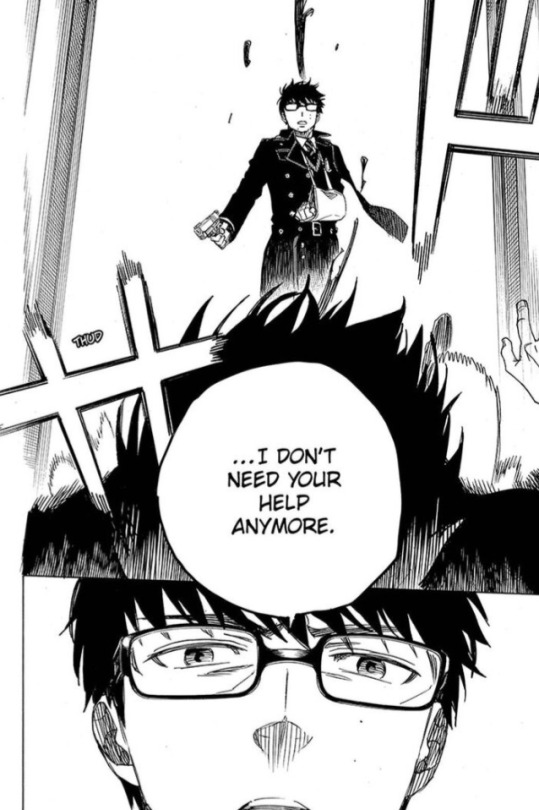
This is kind of the crux of it all. Yukio is suffocating on his own perceived weakness and seeking to escape it. Here, Yukio is burning every bridge (the fact that this is literally taking place on a bridge is pretty ironic) that could possibly allow him to return to the Order to ensure he does what he needs to do. To be strong, he needs to be independent. To be independent, he needs to be alone. He can't let his brother solve all of his problems anymore.
So, like. Yeah. In conclusion, I think Yukio is heavily inspired by his brother's strength of character, just as much as he feels abased by it, and that's why his ideas of strength steer closer to broader concepts like bravery and self-determination rather than "let's hit the gym and summon Satan." He uses physical strength as a mask to conceal his perceived emotional weakness.
#i hope this made sense lol#Idk i see a lot of posts saying that Yukio's jealous of Rin’s demon powers or whatever and i think that's dumb#it seems more like he wants to be his brother's equal (or even someone Rin looks up to) and he fails to realize that he already is#anyway. this post is long as fuck. I should start tagging these as something#al yells#blue exorcist#yukio okumura#haven't made a long post about Yukio in *checks watch* one day time to make another one
130 notes
·
View notes
Text
The Ultimate Hero: Uravity
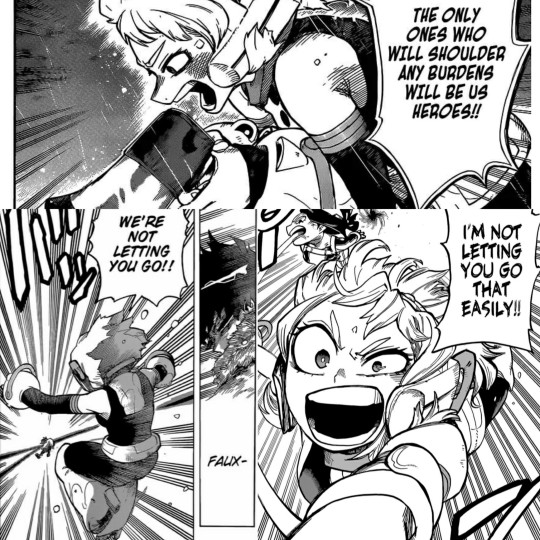
So, I guess the biggest plot point I have noticed for Ochako is to not let people go.
On one hand, we have Deku:
The greatest asset for the heroes; all tattered and bruised running away from his own comfort and happiness to protect his loved ones because the hero society has brainwashed him into thinking that heroism is all about sacrifice and he is the only one who can offer that.
And then, we have Toga.
A cunning villain according to the heroes, a constant thorn on their side.
But in reality, Toga's not a monster that she's perceived to be. She was just an unlucky girl born with a cursed quirk that led her friends and even family boycotting her.
A teenage girl, whose feelings are all over the place. A girl who loves heroes and wants to be like them. A person whose biggest question is that her life matters or not?
And then, we have Ochako.
More under the cut_
Who has failed thrice in reaching out:
First, when she didn't go after Bakugo. She convinced everyone else too, to not go after Bakugo in the Hideout Raid arc because of her own passiveness.
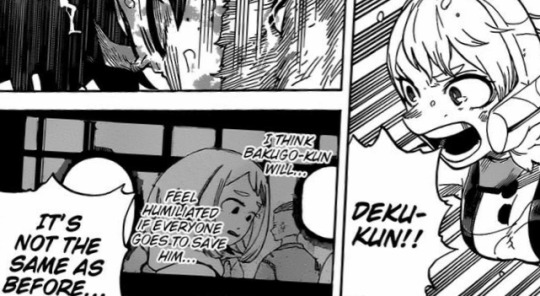
And then she even regrets later and tries to fix things up. But well we know how it goes.
Then she failed to save Sir Nighteye. He was a hero, that died in her arms and there was nothing she could do but helplessly watch.
We see some character development as she rushed to save Deku from the Black whip but just mindlessly running into danger without a plan in mind is not the best solution to a problem Chako cheeks.
But, baby-steps.
We have Toga. It's because she failed to answer Toga's question properly during the war (not that I blame her for it, considering the situation) that Toga turned into the villain she is now.
And finally we have Deku. A product of the society who's brainwashed into thinking that it's his Destiny to suffer in silence because he's a hero.

And yes, there is reason Ochako is highlighted here.
Deku isn't just a random person. He is her best friend and a fellow hero who is willing to suffer in silence for the greater good.
But doesn't he deserves to rest?
This is the bigger questions of the story asked several times.
Who is a Hero?
How do you define a hero?
A figure who doesn't flatter in a situation no matter how dire?
Or someone willing to stand up against the injustice?
Or just a tool of violence to keep villains down?
And that is exactly why Deku is the first person that Ochako saves. Not his life, bit his heart.
It's noticable how much importance heart is given in MHA. A story about saving the hearts of people.
This is also the reason why Ochako succeeds where even Best Jeanist fails.
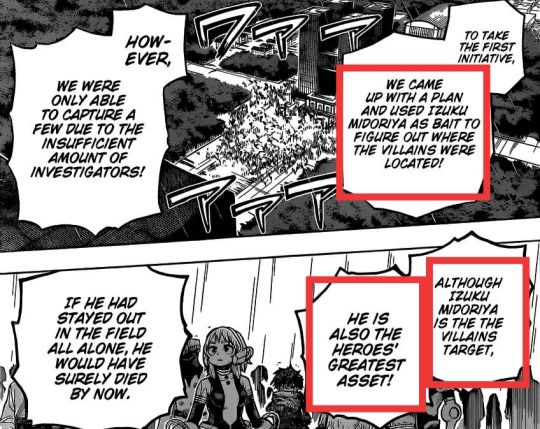
The No#03 hero, Best Jeanist, a fan favourite, failed to convince the angry and panicked mob because he said that Deku is their biggest asset in this war and that they need him to win. Because in their eyes, an asset is what he is.
A tool, a weapon.
And tools can be kept anywhere. They don't have feelings. Why UA?
Because he's also a human.
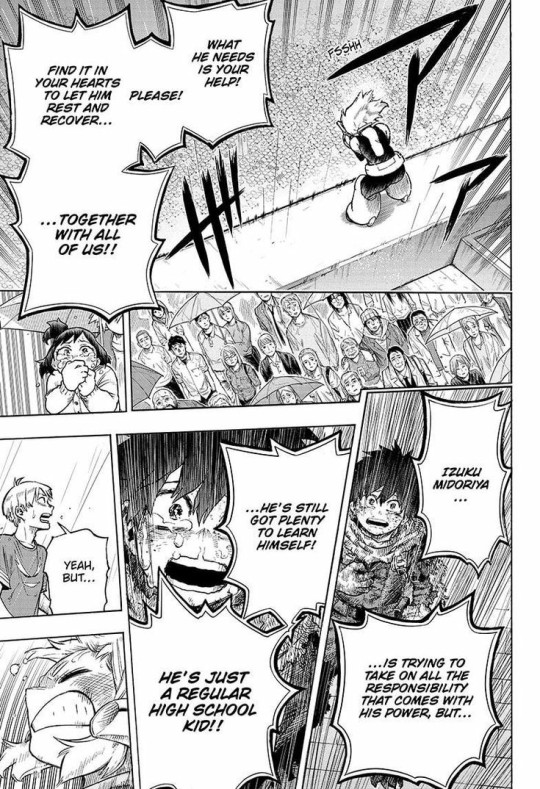
More precisely, he's a High-schooler.
He shouldn't even be fighting there.
He has plenty to learn himself.
And like how All Might gave him the right to be hero..

Ochako gave him the right to rest, as human.
For Toga:
We've seen that Ochako looking back to her fight with Toga at the mansion. She was regretting about her actions as a person, something she did not considered before.
And now, she's on the battlefield ready to save both heroes and villains because they're both people. They are powerful but they're just as helpless when it comes to them.
They have bad pasts and horrible things happening to them.
They make mistakes and they're put on pedestal, but
Their lives matter.

Their happiness matters.

Their smile matters.
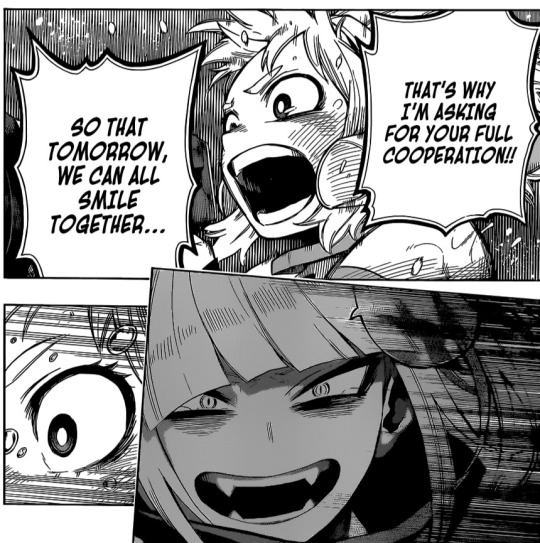
So, Uraraka's arc is about humanizing both heroes and villains. How they both are the victims of this superhuman society and how they both deserve peace and quite.
Which is why I think Ochako will be the turning point of this manga, now that everything have possibly gone wrong in the worst way possible.
Toga is out with her sad man's parade and dabi is there too, along with AFO all because Spinner's voice reached Kurogiri.
Ochako's name means a 'bright and sunny day' and her power is literally making things weightless. So what if she makes this entire deals weightless by getting Toga on their side?
Principal Nezu already said in his speech that they're just one step away...from understanding each other. And taking that first step is always hard...and when someone takes that impossible step, it leads to the birth of a true hero.
And yes, URAVITY is that hero.
A symbol of hope.

The greatest hero that will surpass even All Might.
#bnha 375#bnha 376#bnha 377#bnha manga spoilers#bnha#bnha ochako#ochako urakara#uraraka ochako#mha uraraka#ochako#bnha uraraka#my hero academia ochako#urakara ochako#ochako uraraka#uraraka#katsuki x ochako#mha toga#himiko toga#toga himiko#mha deku#bnha deku#bnha izuku#izuku x uraraka#uravity#bnha manga leaks#bnha midoriya#ochaco#ochaco uraraka#mha uravity#togachako
336 notes
·
View notes
Text
The Actress Who Waited a Lifetime to Become Katara
Kiawentiio talks joining the cast of Avatar: The Last Airbender and playing a character that means so much to so many

The 17-year-old actress Kiawentiio (pronounced gya-wuhn-dee-yo) can’t remember a time when Avatar: The Last Airbenderwasn’t part of her childhood in some way. Growing up on the Akwesasne Mohawk reservation in Ontario known as Kawehno:ke (or Cornwall Island), Kiawentiio—who was born in 2006, a full year after the beloved animated series debuted on Nickelodeon—recalls having older siblings who would have the cartoon regularly playing in the background of their house. Years later, when all three seasons began streaming on Netflix, she revisited the series and developed a newfound appreciation for its narrative ambition.
So, when Netflix first announced that it was developing a live-action adaptation of Avatar in 2018, Kiawentiio told her team to get her an audition for Katara, the 14-year-old girl who is trying to fulfill her potential as the last Waterbender of the Southern Water Tribe after her mother was killed by the ruthless Fire Nation.
“By the time they actually did start casting, I got the call from my manager that was like, ‘Don't freak out, but we think we have the Avataraudition.’ And obviously, I freaked out,” Kiawentiio tells Harper’s Bazaarwith a laugh in a recent phone interview. Of all the roles she had auditioned for, this one was at the top of her bucket list, because she knew that it could have the same impact on the next generation of Indigenous children that it had on her. “Katara was one of the only people that I could really see myself in. With the role model that she is for young Indigenous women, it's hard not to be drawn to her, especially when the representation is so scarce.”
Kiawentiio got her wish in the spring of 2021. After undergoing an intensive audition process, complete with a seemingly never-ending number of Zooms and chemistry reads, she got the news that would change her life. “They sat me down for another Zoom call, and I was expecting them to tell me it might take a while, but [creator and showrunner] Albert Kim ended up telling me what the project was, who I was auditioning for, and then I landed the role, and I was crying,” she recalls.
Every diehard Avatar fan can recite the basic premise by heart: Long ago, the four nations—Water, Earth, Fire, Air—once lived in harmony, with the Avatar, the master of all four elements, keeping the peace between them. But everything changed when the Fire Nation attacked and wiped out the Air Nomads. A century later, Aang (Gordon Cormier), a 12-year-old Air Nomad who has been frozen and suspended in time in an iceberg, reawakens to take his place as the next Avatar. Feeling responsible for the destruction he was unable to prevent, Aang sets out on a quest with his newfound friends, Katara and her Water Tribe leader brother Sokka (Ian Ousley), to save the world from the onslaught of the power-hungry Fire Lord Ozai (Daniel Dae Kim), who is determined to place all the nations under his authoritarian rule.
Katara, as Kiawentiio puts it, is the heart of the Avatar crew tasked with using their bending powers to restore peace in the divided world. “I think the core factors that make Katara [who she is] are her hopefulness and her optimism, and she's the person in the group that can keep them moving forward in a positive direction, and I think without that, team Avatar wouldn't be able to see the light,” she says.
Below, Kiawentiio reflects on the defining moments of Katara’s arc in the first season (which was shot two years ago in Vancouver), how she has grown alongside her character, and why she feels a new day has come for Indigenous representation in Hollywood.
A lot of the dramatic tension of the first season boils down to Aang’s internal conflict: Does the Avatar need to act alone, or can they afford to have people who help them along the way? In Aang’s case, he doesn’t just want people in his life; he needsthem to help save the world. Why do you think Katara is immediately drawn to Aang and his mission? How do you think that relationship evolves over the course of the season?
I think the reason that she was drawn to him in the first place was this energy of bender to bender, honestly, and I feel like that type of energy [bonds them] not only physically, but just spiritually. It's really intertwined in who they are because Aang plays a huge part in Katara's growth physically with her bending, and I feel like it was just this calling of fate and where you're supposed to be. But in terms of how the relationship has grown, I think it really is just blossoming into a family. Team Avatar is a family in our show. They're not going to leave each other's side; they're always there for each other.
Midway through the season, Koh, the face stealer of the spirit world, temporarily imprisons Katara and her brother Sokka and traps them with some of their darkest memories, which allows us to see, rather than hear about, their backstories. In Katara’s case, she is forced to relive the day she lost her mother. How do you think that loss has affected her in the present day?
It's just painful and that is the point of Koh, right? It is to weaken his prey with their own pain and their own memories. The way I see it is she probably feels helpless. She can't do anything, and that's really what has held her back. What has stuck in her mind is the fact that she couldn't do anything [to save her mom], and to be stuck in that painful loop definitely puts a damper on her confidence that she's been working up this entire season.
That memory of the loss that she went through is a roadblock, and that's something that she has to try and overcome as we go through the series because it really is the main reason that she can't get to that next level [of waterbending]. In the episode with Jett, after he shifted her perspective on how she was thinking and how her memories were acting up, she really unlocks that good energy that her mom was trying to leave her with.
It's impressive how together Katara actually is, especially in our season, because the flashbacks and her memories are so brutal that it's like, "Wow, I can't believe you are still normal." [Laughs.] But that goes to show how resilient she is and how strong she is. I think that was one of the things I took away from her while playing her. I tried to implement her message in my life more to be more optimistic and to have that hope and strength.
When she arrives in the Northern Water Tribe, Katara realizes that the women of this tribe aren’t allowed to fight, which comes as a bit of a culture shock for her. But it’s moving to see how she is able to mobilize the women of all ages when the tribe is under siege by the Fire Nation. At the end of the day, they are the ones who helped defeat the enemy.
Arriving at the Northern Water Tribe was something that she was looking forward to all season, and I think in her mind she had this image of like, "I'm going to get there. I'm going to meet a master, and he's going to teach me everything I need to know, and I’ll finally be able to reach that next step [as a Waterbender]." And getting there and being told basically all your work is not going to be paid off [because you’re a woman] was, in my opinion, devastating. That devastation leads straight into anger, which I relate to. I feel like I get the same waves of emotions, and then that leads to wanting to prove them wrong, wanting to change things [like Katara does]. Honestly, that scene with the women [Waterbenders] is just so beautiful, and it was one of my favorites to film. But I think in her mind, she was just reality checking Master Paku: "We are literally in a war. We are not going to make it. Just use your resources." And not only was that the realistic thing that needed to happen, but the change that she's been fighting for [all season].
I read that you trained for six months ahead of production to commit Katara’s waterbending motions to muscle memory. You spent that time going over forms of tai chi and getting strong enough to handle the action sequences.
Boot camp was intense for me personally, just because I'd never really gone through that before and I don't have as much or any experience outside of the show with martial arts. But it was really helpful to be in the same boat as my character, training-wise. At the start of the show, she really doesn't know that much about bending. As we go along through the episodes, we could see her get more comfortable and more confident in her bending. As we watch Katara gain her confidence, I feel like off-screen I was also gaining confidence with those movements, getting stronger as we go and just getting more comfortable in general.
With the critical success of many Indigenous projects in recent years—Reservation Dogs, Rutherford Falls, Killers of the Flower Moon, The English, Dark Winds—it feels like we have reached an inflection point when it comes to accurate depictions of Native American communities. As someone who is part of this growing movement, what is your take on the state of diversity and inclusion for Indigenous communities? And what do you think is the next step that needs to be taken to move the needle even further?
I think we are making huge steps in the industry. I love being able to look around more and more and see more of our faces, and I do think that there's places that we could improve on for sure. But thinking of how far we've come, even from when I was younger, Katara was one of the only brown people that I saw on my TV, so it's really special to be a part of this generation that's being able to do these things.
I think the next step could be just normalizing things, like it doesn't always have to be an Indigenous story to have Indigenous actors, writers or directors. I think that's one of the things that can get touchy in this industry because we want to include everybody of course, but it doesn't have to be so specific. Why does the doctor have to be [only] the Indigenous doctor that came from [this tribe]? Why can't he just be a doctor that happens to be Indigenous?
Indigenous people or actors can be the main character. Obviously, our culture is always a part of who we are, but it doesn't have to be that the reason we are in this role is because we are Indigenous. We can tell our story as a person and still value and venerate our culture without that being the only reason that we're in the story to begin with.
With big blockbusters, I feel like it ends up being like, "Oh, the lead is white, the other lead is white, and then everybody else is a person of color." I feel like that's a theme that we end up seeing a lot. But another really good way to improve [on that] is supporting Indigenous storytellers. We have so many stories, and [telling them] is one of the things that is keeping our cultures alive, and there are so many stories that could be told from our perspective.
#natla#atla#kiawentiio#netflix avatar#avatar the last airbender#netflix atla#avatar netflix#atla netflix#interview#harper's bazaar
26 notes
·
View notes
Note
Hello!😄, I admire the way you write ✍️The way u never mischaracterized characters and the way you write them accurately is fascinating to read for ,and how you also took focus on small details about the character heck im starting to believe you work on the game R1999, if may I ask if you could write about Six from R1999 with a timid S/O or about a self-aware au of Six ? It had been my obsession of him after he came out and with his story making it more fascinating and made me attract towards him more

;R1999 6 - Self-Aware AU

Headcanons about how 6 would act upon becoming self-aware. Related to this Self-Aware AU post.

tysm for the kind words! I rlly like overthinking and overanalyzing stuff <3
I'll do the self-aware AU for this post to match the other one posted recently about 37, but feel free to send another ask if you'd still like 6 with a timid S/O!

There is a lot to be discussed about 6 and how all four characters of the 1.4 update contrast and complement each other so wonderfully, but I have a lot of trouble narrowing down what exactly I want to talk about here and what I should save for a proper analysis of the characters and the way I interpret them. So as usual, I ask that you guys bear with me with these trains of thoughts!
For starters, in my opinion, 6 is a very good narrative foil to 37.
Both focus on alienation and isolation from their respective communities, both are characters that struggle with the concept of fate, and both were born knowing their numbers--the key difference is the way each tackles this piece of information.
As discussed before in her own post, 37 does not question the reason why she's 37: like 210 says, "she stumbled upon fate at birth," and did not go through the same process of having to figure out one's number like the rest do. When it comes to 6, it's slightly different but the fundamentals are the same: he knows the number he will be assigned, and yet this revelation is not part of a natural process, it's something that us forced upon him and his family.
What I'm trying to say is that 37 and 6 weren't given the choice of discovering their soul numbers, and thus lack the most important part: the understanding of their own lives and selves. Compare this to 210, who became "too predictable" upon finding out his own soul number, or Sophia, who has clearly developed a very complex relationship with her own friends because of the inferiority and feelings of inadequacy she feels not knowing her own number.
And this is when the contrast between the two become clear: 37 is partially isolated from her community because she doesn't understand fate, nor the importance of one's journey, she doesn't respect the discovery of one's number. 6 is partially isolated from his community because no one else but him is able to see the concept of fate--or the Revelation--as a negative thing. His entire life, his entire bloodline is defined by fate and the Revelation, but only he understands the burden and the pain such knowledge entails.
Because only he has seen the way this Revelation takes over his loved ones, until they become strangers, mere vessels for infinite knowledge and bound to their role as perfect, eternal leaders. His character event shows the radical change in his aunt once she receives the Revelation and 6's fears of his entire self being rewritten once he receives it as well.
It's important to note that the moment Atticus becomes a proper 6 and receives the revelation happens on the very same day that everyone on the boat becomes a victim of the "Storm." Sophia's father and 37's mother were on that boat--but so was Alma, the current 6 at the time and Atticus' aunt. This event is crucial for all characters, as it cements their chosen paths: it's the study of the Emanation for 37, to continue her mother's research.
It's the day 6 will receive the Revelation and see if his efforts to prepare for it will amount to something.
And yet we know that 6 was able to withstand this Revelation without his entire self being washed away by the infinite amount of knowledge. We know this because we see him retain his hermit-like behaviour in the main story, avoiding people and preferring peace and quiet. We know this because, at the very end of this event, he says that the revelation is "just as simple as it is."
37 does not understand fate, but she doesn't fight it either because studying it won't change the fact that her soul number is 37. 6 understands and once feared fate, and he fought to resist it because his entire life, his memories, his personality and essence were at risk. I also really love that small detail about how 1.4 focuses on Plato's allegory of the cave, with 37 and 6 being put on this pedestal as those who witnessed the truth and came back to save the others--and yet, these two characters needed people OUTSIDE of the island to help them with their respective journeys (37 with Vertin, and 6 with Sophia). It just clicks so right to me!
In the context of a Self-Aware AU, I like to think that the self-awareness is something that comes with the Revelation. That every 6 before Atticus himself realized the truth of their world, similar to how 37 sees this self-awareness as yet another eternal truth. And because the number 6 is meant to represent harmony and perfection, they understand more than anyone that to ensure the peace in Apeiron, they cannot allow others to know the truth. Think of it as the whole deal with Pythagoras and irrational numbers--the discovery of irrational numbers ruined the whole system.
I think that a much younger 6 would've been distraught at this information, to know that Alma was the only person who was "real" and that he began to drift away from her because he couldn't recognize her anymore. But now, after receiving his Revelation and becoming the new leader, he might be more focused on appreciating life as it is. Why would he be bothered by knowing everything so far has been a script? He's already been haunted by fate his whole life, this is, in the end, the same thing. Of course, 6 is a philosopher in his own right, despite knowing pretty much everything there is to know, I think he would like to ponder about the more existential issues and topics that come with self-awareness.
I also like to think that his self-awareness and the Revelation come with knowing how the story will develop, at least in relation to Apeiron. He knows of Vertin's arrival, he knows of Arcana's schemes, he knows that by the end, Apeiron will be revealed to the human world. 6 believes it's impossible to change the course this game and its story, and the best thing he can do is help everyone prepare for it--I like to think that's why he specifically sent 37 to greet Vertin and the rest!
When it comes to finding out about the Player, I already said in 37's post that it would be very nice if she could see the player, but not hear them. And to contrast that, I wanted 6 to hear the player, but not see them.
The Player's existence is the one thing that 6 cannot pinpoint nor rationalize. He listens so very attentively when you speak, and he quickly realizes that you are not part of this infinite stream of knowledge from his ancestors, you're ... Just a person. What are you trying to teach him, if that is even your goal?
At first, I can see him struggle with this strange presence interrupting his very much needed alone time, choosing to remain silent until you go away, but he would grow to find it comforting, similar to his friendship with Sophia when they were children. You are an outsider, you're not part of this little world he lives in--you can offer a refreshing and different perspective. Once he's used to this new change, perhaps he will speak again, either to ponder out loud about your existence or monologue about whatever might be occupying his mind. Unlike 37, he wouldn't tell a single soul of your existence, largely because he believes it's something unique to him, entirely unaware that there's someone out there behind the screen rooting for him.
41 notes
·
View notes
Text
What I adore about Jantje’s writing which shapes the narrative of Dark and I hope will be true for 1899 is that there are no evil villains in her stories. That is to say, all the characters are powerfully, tragically, sometimes horrifically motivated by love. (spoilers for Dark and 1899 ahoy)
In Dark, off the bat in season 1, we’re introduced to so many different complicated characters, with secrets and troubled pasts and choices that do more harm than good. What stood out to me is that as s1 built up, scenes would hint that Peter, Helge, Tronte, Aleksander were very suspiciously framed to be culpable for the missing boys. That they had nefarious intentions or ties to the boys’ murders. To the point where I felt very uncomfortable whenever scenes included them, because I thought that they were hiding something dark and evil.
Then, as the show progresses, you find out:
Peter had never harmed the boys. On the day of Mikkel’s disappearance, he was trying to keep a promise to his wife, discovered Mads’ body, and tearfully called Tronte because that is his son and his boy and no tragedy like that should have to be borne alone.
Tronte had nothing to do with the boys’ deaths. He was weeping over his missing, now confirmed dead, son from thirty-three years past, and was now tasked to keep that a secret.
Helge did have something to do with the boys’ disappearances, but he had been so deeply traumatized that he was made vulnerable and manipulated by the only tenderness he really knew. His old (present) self was, in fact, trying to stop his past self from continuing the acts, and died attempting it.
Aleksander had secrets, but I don’t even need to explain in depth how tender he is, how his love and protectiveness of Regina is what defines his character first and foremost.
And that’s only the tip of the iceberg. We haven’t even gotten to Noah and Adam yet.
Noah was terrifying in s1. I was so scared every time he showed up on screen. He was very obviously embedded into the darkness of Winden, responsible for the disappearances and deaths and manipulations. He was straight up frightening.
Then in s2 and s3, you find out he is a pawn in someone else’s larger game. That he has been trying to find and protect his daughter this whole time, searching through time and space for his missing Charlotte and willing to tangle time for her. That he tenderly and wholeheartedly loved Elisabeth, and died trying to stand up to Adam for his girls.
And Adam--Adam was our beloved Jonas this entire time. Our sweet, haunted, beloved Jonas. And Adam wasn’t doing this to be evil. He became corrupted, obsessed, manipulative, but he was and still is our Jonas. And in the end, he rested his forehead against Eva’s and faded from reality.
All of the characters in Dark were culpable in some way, but they were also entrenched and moved and shaped by love, some in more horrifying ways than others. Colloquially speaking, every baddie is a saddie, and that sort of story is so moving and heartrendering. I know a lot of people don’t like Hannah Kahnwald (I personally love her), and however way you feel about her, you can’t deny that she loved her Jonas, despite her own failings in it, and that is irrevocably sealed in the closing shot of Dark--Jonas is gone, but his mother loves him.
I truly hope the same will be for 1899, and I can see it playing out already. Many of the characters we meet--Ling Yi, Ramiro, Tove, Krester, arguably Olek, etc.--have secretly killed or hurt someone and it haunts them, and they are also frightened, tender, moved and motivated by love for family or friend. The first mate, who seems like a classic thug character for starting a mutiny, sacrifices himself to save Tove. Iben is harsh and likely unwell, but she sobs her son’s name and drowns embracing her husband who sacrificed his life and his convictions to stay by her side. Henry, however disdainfully, said it himself: every simulation the test subjects fail because they choose love over reason. Right now, we don’t know what are the intentions of Henry or Ciaran, a lot of characters are ambiguous or mysterious and anyone who has boarded Jantje and Bo’s storytelling before know that we can never truly predict how a story may go, and that our suspicions rarely pan out.
But I think, and hope, one storytelling element that shaped Jantje and Bo’s storytelling will carry over truly into 1899: everyone--however antagonistic or manipulative or tormented by ulterior motives--everyone loves.
376 notes
·
View notes
Text
Queer Star Wars Characters (Round 2): Legends Match 2

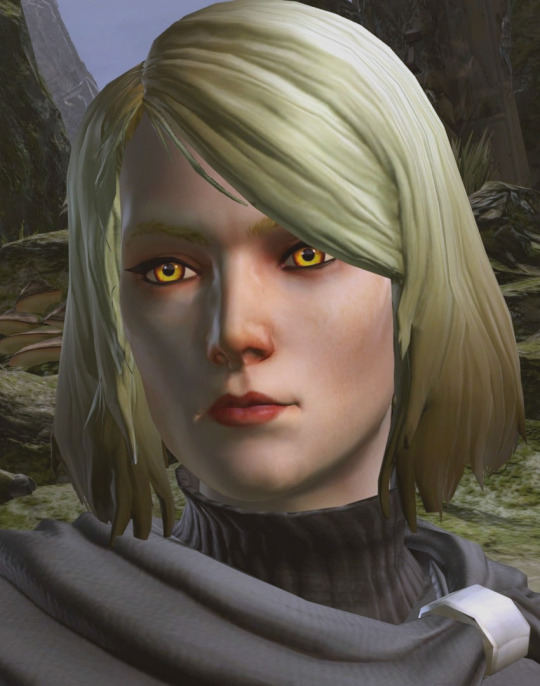
Juhani | Identity: lesbian | Media: Knights of the Old Republic
Juhani from 2003’s Knights of the Old Republic was the first ever queer character in Star Wars. The Mandalorian Wars rendered Juhani’s family refugees on Taris after the destruction of their homeplanet of Cathar. Juhani was enslaved due to her mother’s debts, but was liberated by the Revanchists when they freed Taris from Mandalorian rule. This inspired her to travel to Dantooine to train as a Jedi, where she fell in love with her fellow padawan Belaya. For her final trial, she was tricked into believing she killed her master when consumed by the Dark Side. She fled into the wilds of Dantooine, her turmoil agitating the wildlife. Dealing with Juhani is the player’s final trial as a Jedi, and they can either kill Juhani or handle the situation diplomatically and return her to the light. She then joins the player as a companion.
Traveling together, Juhani grows close to Revan and can be romanced by female Revans (the game shipped with the gender flag for romance bugged, but she is intended to be a lesbian). She takes the player turning out to be Revan very well, as she never truly accepted that Revan turned to the Dark Side due to how the Revanchists saved her. If the Dark Side ending is chosen, the player must kill Juhani.
Juhani strives to be a good Jedi, strongly believing in their principles. However, she struggles with the in-born aggression and heightened anger of her species, which with her perfectionism creates a vicious cycle that drives her towards the Dark Side. Other than Revan, she kept herself separate from the rest of the crew of the Ebon Hawk, especially Canderous Ordo due to the Mandalorian’s genocide of her people. She was also full of bitterness regarding the racism she faced on Taris, and struggled not to lash out against all humans because of it.
Lana Beniko | Identity: playersexual | Media: SWTOR
Lana Beniko is a Sith, but like chill about it. The head of Sith Intelligence, she is willing to work with the Republic when necessary to oppose the greater threat of the Revanites and the resurrection of the Sith Emperor. When the Eternal Empire came to take over the galaxy, she left the collapsing Sith Empire to look for the player character. She rescues them and joins them in the creation of the Eternal Alliance, where she can be romanced. She’ll be by your side through countless trials, willing to make the hard decisions. She’ll even join the Republic if that’s who you choose to align the remnants of the Eternal Alliance with.
As paradoxical as it is, she’s the Sith at their best- what the propaganda of the Empire says they are. She isn’t consumed by her emotions, and her use of the dark side is defined as her using the Force instead of trusting in it.
58 notes
·
View notes
Text
it's that time of year again: AK's 2023 Wrapped™. no, not the music thing. the december year-in-review thing. my spotify charts were deeply unfunny this time around because of all the game soundtracks i've been listening to. i don't know when these end-of-year posts became tradition for me, which is to say i could find out and i'm too lazy to check. the important thing, like lemon pigs or eating black-eyed peas, is that it feels like we've always done it. in the depths of winter, the warmth comes from the routine.
i won't beat around the bush about it: it's been a difficult year. it's been hard enough that it doesn't seem appropriate to joke about it or wave it off in favor of big, blog-worthy wins. times are dark right now. it behooves all of us to think deeply and check on each other. i hope i've been a decent friend to the people who needed it. so instead of scraping together a halfhearted victory lap, i'm going to go against my better judgment and be vulnerable.
it wasn't all bad. i got promoted to staff narrative designer this year, which is a fancy way of saying "you don't have to do time cards anymore." it's strange: in an industry infamous for volatility, my job has become one of the few things i can rely on to be positive. i believe my coworkers like me, which is good, because i like them. i feel not just included, but welcomed at work social events. i've developed a reputation for being a garbage goat on my writing team. "got an odd job? give it to AK. we can count on her to eat it." i had the chance to collaborate with someone i've looked up to for years, and i was delighted to find out how amenable they are to work with. there's work stress and there's work stress. everyone has challenging days, but it's not the crab bucket that voltage was, so it never seems that bad. i keep it in perspective. sure, these tasks keep me on my feet, but is it three cents a word, seven thousand words a week? i'll live.
i just wish it had all been good. it speaks to how my health has been that getting covid in february was one of the most mundane things to happen to me. i did everything right. i had all my boosters. i had paxlovid. i recovered well. still, it knocked me out of orbit in the psychological sense. i stopped getting enough exercise, though i'm building myself up again. i became neurotic about my stats. am i Getting A Good Grade In Blood Pressure? what about Pulse Rate? two months later, i came down with a strange, unrelated condition that was nowhere near as serious as covid, but made my life ten times more difficult. i'm happy to report i feel worlds better these days. even so, it was a bizarre time. bodies sure are curious.
later, my sink flooded my closet, and for a few days, i had to reckon with the idea that mold might destroy my entire wardrobe. all those irreplaceable pieces of character design that i've built my identity around since i was eighteen years old. who would i be without them? a wise person would say it was a lesson: stop defining who you are by your looks and find worth in your inner self. the mold is gone and my clothes are fine, but sometimes i have days where my lungs seem like they're sort of operating at ninety percent. i'm trying not to fuss about it. my checkups are normal, and i feel fine whenever i get out of the house for a while. maybe it'll go away when i move. because, hey, i can contemplate saving for a house now. how about that? remember when my mother and i were homeless? what a surreal landscape of highs and lows.
maybe grief is strange like that. in july, just when my health started to settle down, my grandmother died. it was a long time coming. she was 94 and extremely frail. i handled it well at first. it took the ensuing few months for the full weight of human mortality to sink in. before, i'd mainly been to funerals of warm, but distant old men, great patriarchs who loved but didn't relate to little girls. her, i knew. she was there when i was born. i won't go into detail, but it was not a peaceful passing, and it left problems in its wake. you don't live through that without taking a long, hard look at your life. everyone gets the invincibility knocked out of them sometime.
my mother is too disciplined to let it get the better of her. on the worst days of her life, the stove still got cleaned and the bills got paid. when people give her condolences, she encourages them to look on the bright side: she got almost seventy years with her. how many children can say that? but i can tell she's sad, and i'm not under any illusion i can help. i have to sit with it. there's nothing else for me to do.
under different circumstances, i'd have thrown myself into my work. i'd come up with some writing project to avoid thinking about it. i guess the dominant theme when it comes to my personal writing has been inertia: accomplishing nothing and being unsure of myself. if it's a growing pain, it's a rough one. i question my storytelling instincts so much, it's hard to get a story off the ground, let alone take it anywhere. i've hit a point where i find the conventions of the romance genre limiting. i still want to write about people in love, though, and i can't reconcile the two. why do some love stories get to be love stories and others are "just romance?" you could ask why it's "just" romance, and that's a good, but different conversation, i think. what are the great love stories saying about the human condition that i'm not? what is my work saying, period? not a whole lot, i'm afraid. i used to be pugnacious about writing from my id brain, about doing it for the fun of it. i worry that's not going to cut it anymore. i have to push myself harder. i also have to stop fretting about being perceived as pretentious for asking these questions.
it would be easier if i had more answers. i'm not sure which project to work on next, because they're all half-formed outlines with plots i don't know how to fill. i'm not sure whether it'd be weird for someone with my job to keep writing or posting fanfic, no matter how informally. i'm not sure what role physical intimacy should play in my writing, if any, because along with everything else, this was the year shame caught up to me. i'm not sure what happened there. i hope the "are sex scenes necessary" debate didn't get me, because i'd argue for their artistic merit any day. but when i do it, i worry that it's indiscreet somehow, like i'm revealing myself in ways that make strangers uncomfortable. some days i feel like going through my backlog of published work and tearing out all the sex-adjacent content like a power-mad inquisitor. i won't, because i'd regret it, but i spend a lot of time being embarrassed. it's embarrassing. i can't escape the feeling that people don't want to know that about me.
despite it all, it's still bad form to end on a down note, so i'll leave you with this: after five years, i finally got into physical therapy for my arm. i told my doctor the whole sob story and she put in a referral to a hand/occupational clinic. will it help? i don't know. i've tried so many things that haven't. but they're optimistic that i'm in better shape than i think - i've heard a lot of "wow, we get patients who can't even open a jar!" - so it's worth a shot. if it means i can draw a little more, it's something. i still make time for the picrew every day. ever onward. thanks for hanging in there with me, guys. you keep things interesting.
41 notes
·
View notes
Text
the many layers of kiara
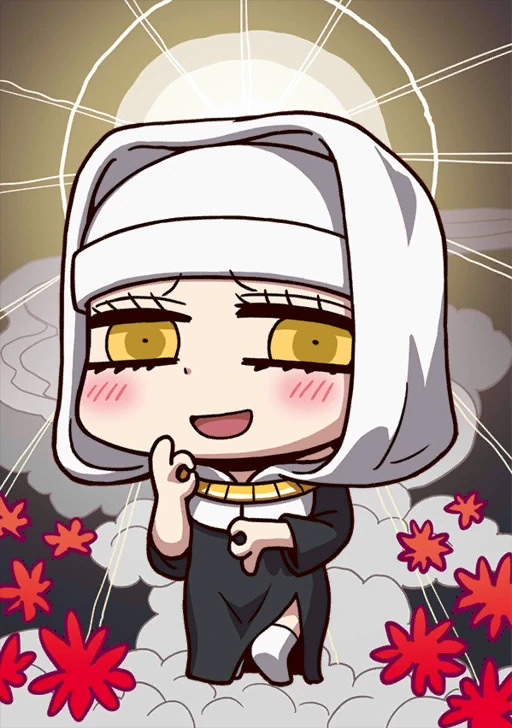
hello! im here to shill about why kiara's a fantastic villain and why i love her so much :^) the deeper aspects of her character are veiled behind subtext and tidbits of lore sprinkled throughout fgo and ccc, so here's a post compiling them!
cw child abuse, child neglect
kiara is described as a woman who's "introverted" and "timid" yet "active" by the fate/extra materials. she's a mass of contradictions - a nun who's sensual, a submissive personality who acts solely for her own pleasure. andersen... doesn't have many nice things to say about her
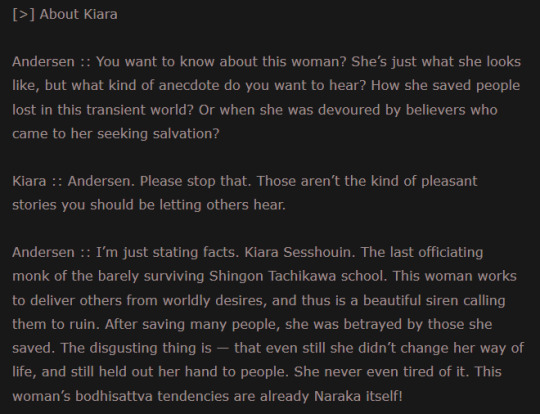
the shingon tachikawa school actually existed. it's a failed branch of shingon buddhism drawing inspiration from esoteric buddhism, specifically sexual pleasure and intimacy to achieve enlightenment. records of it are scattered, as its reputation is... Not Too Hot
needless to say, kiara was raised in a cult since her birth. from her max bond ce, the materials, and the fgo ccc manga, we can infer that she lived an isolated and lonely life. after all, what cult would neglect a sick child to the brink of death?
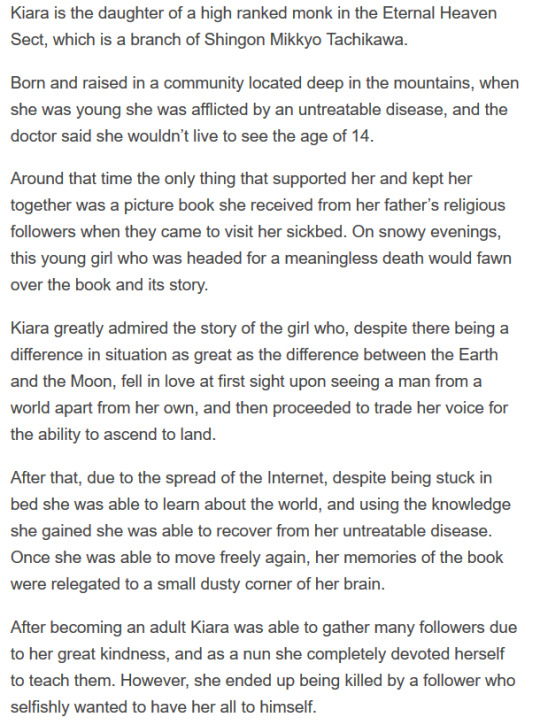

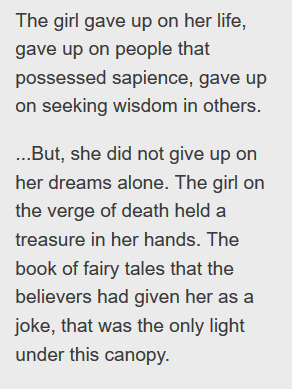
what hammers the point home is that fgo!kiara was happy. she was saved by an outsider who cured her sickness. because of that, she was able to leave the cult and have a normal life - to experience everything ccc!kiara was not able to. when zepar puts her ccc memories into her, kiara is horrified. she's traumatized. the weight of what she experienced - the childhood she underwent in another universe, coupled with the madness growing in SERAPH - was so bad that zepar had to remove her kindness in order for her to accept what had happened to her.
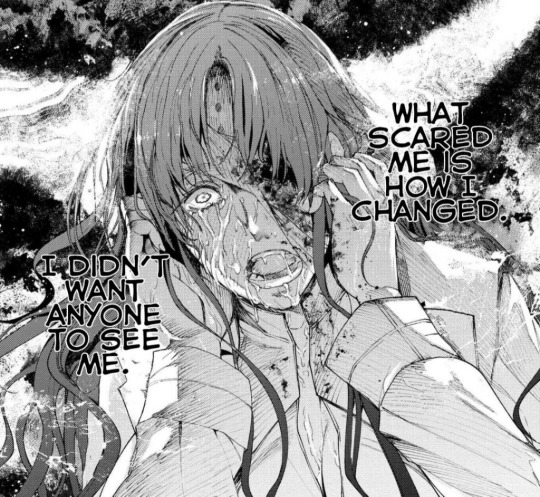
which leads to her character-defining lines, her reason for her hedonism and evils:


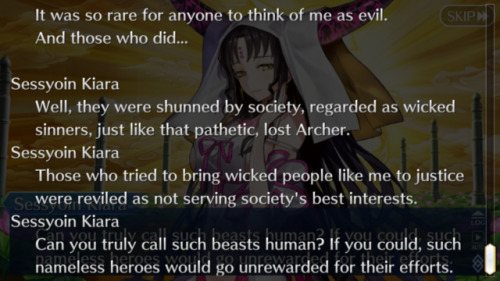
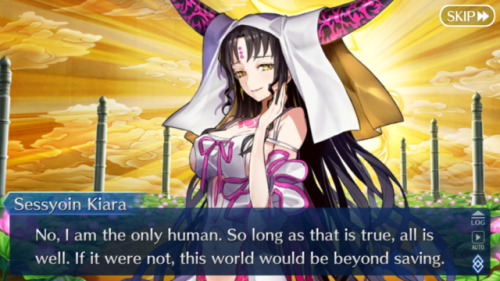
there was no one to save kiara. there was no one to let her out of the hell she was born into. in the end, she still died before ccc's beginning, existing only as a spiriton copy, and she no longer had a place in the real world.

the true tragedy of kiara is she's a twisted version of the little mermaid. she wants to understand what it means to live a human life, to feel human emotions. at the end of ccc, she begs andersen to tell her the difference between ai (愛) and koi (恋) - she's never known "koi." andersen puts it aptly in his confession to her:


kiara's tragedy is that she was born and raised to be a symbol and savior, without any regard for her humanity. because of this, she had to struggle to justify WHY humanity was worth saving when there was a lack of it in her home. all she ever saw was pain and chaos
again: she is the only human. she must be, bc that's why others would enact such heinous crimes in her name. bc that's the only way she can continue being a savior when she was exposed only to humanity's ugliness.
anyway! i love kiara and if u want an in-depth abt her i wrote one here :^) thank u bye
191 notes
·
View notes
Note
Are you going to keep Goosefeather's curse? If so are you going to change anything about it? From my memory the book was... depressing.
It will probably get rolled into Pinestar's Crusade, building it up into an SE rather than just a novella. There's actually a lot going on in that specific moment, and it makes sense to go over it all at once.
So to answer your question, yes, most of Goosefeather's Curse is staying. Most of the Crusade Generation have depressing stories to tell. If the Thistle Period is defined by the fact that Thistle Law metastasized and went terminal, and if the Campaign Era was when it was newly born, then the Crusade Era was when it was first conceived.
I've been thinking about Pinestar's Crusade idly and mentioned it a few times, but here's my fragments so far;
PINESTAR'S CRUSADE
(Fuses Pinestar's Choice and Goosefeather's Curse)
We start in the Crusade Era; there is now more focus on 3 major characters, though it's still built around Pinestar as the POV
Pinestar, Goosefeather, and eventually Pinepaw's apprentice Speckletail.
Pinepaw is born into the start of the Crusades, a bloody period where the Clans are invading Chelford and brutalizing cats in the hopes of appeasing StarClan. He only begins to learn the full story of what happened in Darkstar's Commandment once he begins going to Gatherings as a warrior
The truth being that Oakstar came up with this idea because he couldn't take an L
But even as an apprentice, it becomes quickly apparent to him that what they're doing is evil. They were brutalizing kittypets who aren't trained to fight back.
During his first raid as an apprentice, he allows a ginger-and-white mother and her kittens to escape
This came back years later, when that queen, Crystal, forms BloodClan in response to the Crusades.
Pineheart watches Oakstar die barely a year later to the queen he saved, using early claw extenders to cut right through him. Even if he hadn't been on his last life, it would have ended him.
But, Crystal lets Pineheart go, recognizing the Clan cat who had saved her life.
Watching his dad die along with several friends, and countless more innocent Chelford, plus being released by Crystal, is a Formative Moment.
Doestar continues the Crusades in the name of revenge for Oakstar, but now that BloodClan exists and is ARMED, the easy raids become bloodbaths.
They slowly peter out, not with a bang but with a whimper. She never announces an official end, eventually she just stops organizing them. No one gets closure, especially not Pineheart.
But the 'peace' doesn't last. Just before Heatherstar takes power from Smallstar and begins the Campaign to take the Mothermouth Moorland, ThunderClan deals with the Great Hunger
Pineheart and Goosefeather become very good friends, part of a little buddy group that also included Tawnyspots and Pheasantfeather (who will become One-eye later)
Pineheart was given his first apprentice, a rowdy little one and the niece of Doestar, Specklepaw. He's tasked with helping her fill the pawsteps of greatness she's destined to walk in.
Just like canon, Goose predicts the Great Hunger... though, he is an adult this time around because of some timeline changes.
And, like canon, it fails. They couldn't stockpile enough food to last an entire year of famine, a scorching summer and a frozen winter, they end up losing a huge stock of their food as if it was destiny.
Goosefeather was forced into a role he hates, given horrible visions of the future, and argues ferociously with Pineheart; if they hadn't tried to stockpile, they wouldn't have lost all that food to begin with.
It is in this moment, he comes to realize that every time he's fought back and used his visions like a warning, it's backfired.
So, perhaps, they are instruction.
But, meanwhile, Pineheart can't loose his apprentice or his friends. While others were hunting desperately, he was keeping cats alive through scouting for grubs, foraying into other territories, and...
Every bite of kittypet food he took for himself was a morsel in someone else's mouth. But this... this he kept quiet.
It started a "bad habit" he could never break.
Having lost the previous deputy to starvation and on her deathbed, Doestar nominates Pineheart to the position. He was shocked and upset by this, but he was the obvious choice.
Son of Oakstar, Hero of the Hunger, the cat who had kept Specklepaw alive when all the other kits and apprentices starved.
But, Pinestar took the helm to extreme controversy.
Everything Pinestar's ever done that worked was nonviolent. He's never seen battle do anything but bring harm, and the thought of leading people into war... it makes him feel sick.
But the rest of the Clan can't see what he sees. They yearn for the glory days (even though they were not glorious at all), itch to die for a cause, and leave this old, disgusting subsistence survival behind them. ThunderClan wants blood and Pinestar just wants peace.
Taking back Sunningrocks is an example of this. To avoid losing Clanmates, he proposed to Hailstar that they would have a Joust, instead.
ThunderClan's strongest against RiverClan's strongest. Adderfang vs Mudfur.
It didn't go well.
The problem with those sorts of situations is you have to abide by the deal. RiverClan took Sunningrocks for 6 months. It was humiliating for ThunderClan.
Even the cats he'd saved from the famine were furious with him
The only things that DID seem to please the Clan was when he would throw them fully into battle. Such as Goosefeather's prophecy that WindClan's herbs needed to be destroyed...
Every time a situation like that happened, where Goosefeather would phrase things as a Holy Struggle, Pinestar was thrown right back to the Crusades
Terrified eyes, screeching, cats begging for mercy, his father dead at his paws and feeling horror and relief swirling
Sitting vigil for old friends killed in these horrible fights, like Moonflower, it made him feel like how he felt the day he buried Oakstar.
And the bile rose in his throat, remembering that Oakstar was not there at his Leadership Ceremony, damned to the Dark Forest.
A thought was born, here. What does StarClan truly want? What do they expect of him? If they will send the architect of the Crusades there...
What of a cat who stayed fed on human food and fed grubs to his Clanmates? Or a leader who never knows the right thing to do?
When Mumblefoot retired and Sunfall became deputy, the Clan seemed to love him more than Pinestar. He found himself just... sitting back, and allowing Sunfall to call the shots.
It was towards the end, when Leopardfoot proposed an Honor Siring. He was from a glorious legacy, she wanted kits... and on his end, he wanted the peace that raising kittens could bring.
The warmth of human dens was calling him, but perhaps the warmth of love for children could keep him home.
UNLIKE CANON; Nothing about Tigerkit was born evil.
There was no StarClan vision of Tigerstar; Goosefeather knew full well that Thistlestar was the Leader of Prophecy.
But Pinestar would never give Thistleclaw an apprentice in time. Nor would he ever give his own little son to a cat as vicious as him.
Goosefeather never hurt anyone... but Pinestar just needed a push.
Pinestar was already anxious, unhappy, clinging to the goodness that was his little kits. Even as two of them were lost to minor illnesses, shortly after receiving their names.
It wasn't a lie. It was just half of the truth.
"Pinestar... you have a choice to make. StarClan has given me a vision of blood and war, and Tigerkit will have a role to play in it."
He DID have a vision... of Thistlestar. Not Tigerkit. But that was enough for Pinestar, his fear and trauma took the helm from there.
He'd seen his friends, his apprentice, the kits who had been born and died in his rule, all of them turn into the monsters Clan Culture demanded
Nothing he did ever seemed to work, why would THIS moment be different?
How could he prevent Tigerkit from becoming like that too?! Was StarClan telling him to KILL his son??
Pinestar's never had a vision from StarClan. He doesn't have the aptitude like a Cleric... what he has is a nightmare, of Tigerkit growing so large he crushes the whole camp under his claws
After a week of agony, Pinestar unknowingly creates a prophecy of his own,
"Can only the death of a child break fate?"
Sensing he was close to victory, Goosefeather dipped his head, not denying his question.
And it's the last straw.
And that is the climax of Pinestar's Crusade. Broken from his experiences, every turn taken for peace causing him more pain, the idea that he might have to hurt his own son plaguing his mind, he makes the choice to leave.
It wasn't hard, he'd still had that old bad habit of taking bites of kittypet food, a couple friends on the other side. But what he doesn't know is that by leaving with his life... he prevents Sunstar from acquiring his own.
Sunstar had ONE single life, StarClan was not able to give him more with the previous leader still alive. For leaving his Clan, for unknowingly preventing the transfer of power, and for dismissing the Warrior Code, Pinestar is sent to the Dark Forest after his death.
He can choose to walk there, or spend time in the mortal plane as just a spirit, but StarClan offers him no place in the cosmos.
#Pinestar's Crusade#Better Bones AU#So yeah it's still depressing LMAO sorryyyy#im a sucker for the theme where someone you raised and loved became part of an evil system#failure to protect. How COULD you have done differently? Was there anything at all that could have saved them?#i've mentioned it before but I love Pinestar most as the foil of Firestar#and it's very underexplored as an idea#How Firestar succeeded where Pinestar failed#Literally like a brighter version of you#someone who never gave up past the point where you would have broken#and how painful and uncomfortable that idea must be#It doesssss things to me#Also I am still shuffling the timeline#Pinestar might end up being old enough to remember Mapleshade... BUT we'll see#It might be pretty funny to have Pinepaw watch his dad take several Ls in Darkstar's Commandment#''this is my cringefail boomer dad who I have a complicated relationship to. he cannot swim. oh god. oh fuck''
148 notes
·
View notes
Text





thinking about how...
this show has always been about will, his disappearance, and the ripple effect that all has had on everyone. when they mention which characters in particular, it's interesting to note that these are all characters who end up being pivotal / endgame ships. joyce and hopper, jonathan (and nancy), and mike (and will). the only one missing would be lucas (and max), but lucas gets a lot of focus in season one anyway and their relationship is a highlight of the second season. these ships all also continue to grow closer as the show goes on.
mike is introduced as someone with "near-crippling insecurity". he cares very much about falling behind his peers (see: the second sentence) and what others think of him (see: him not wanting to tell eleven he gets bullied). they specifically point out that mike and will escape their feelings of alienation through fantasy. they, unlike dustin and lucas, have a connection to dnd that goes beyond just enjoying it. for them, this is the one place they can be themselves uninhibited or more than what they think they are.
mike finds himself on a real adventure for will. the dogged, devoted, and relentless courage we come to associate with mike was born out of his desire to save will. mike was inspired by will. (see: when he radios lucas and tells him that will could've cast protection, but he didn't. he put himself in danger to save the party.) he becomes the leader we know and love because of will. he faces many monsters—troy and hawkins' homophobia, the bad men, a demogorgon—for will. the last sentence makes you think it's tied to eleven, but really... it isn't.
this is further supported by the fact that mike was originally supposed to enter the upside down by himself! at twelve years old! he was supposed to enter a scary monster-filled dimension because of how much he loves and misses his best friend. he does this for will, because he believes with all his heart and knows that will is alive, and they just need to find and help him somehow. will is the one that inspires mike to unearth that courage he didn't know he had.
the montauk / stranger things bible states that "mike will meet and bond with eleven," but the only time it "defines" their relationship you could say is when it parallels them to elliot and e.t. who are obviously not a romantic couple lol. the only romantic relationship mentioned in this pdf is between jonathan and nancy.
piggybacking off of point five, i feel like that, paired with how everyone pushed mike towards eleven, and the emphasis on mike feeling insecure over never having had a girlfriend or a first kiss, suggests that their relationship in this season is not romantic in nature. not really, anyway.
when mike is talking about their future, this is what he says:
See, I was thinking, once all this is over and Will’s back and you’re not a secret anymore, my parents can get you an actual bed for the basement. Or you can take my room if you want, since I’m down there all the time anyway. My point is, they’ll take care of you. They’ll be like your new parents, and Nancy, she’ll be like your new sister.
whenever mike is talking to eleven without any outside influence, he's always treating her in a platonic or familial manner. she's the one that he's talking about as if they're siblings, not will. he's 100% indisputably describing a family here, because that's what he sees her as—an adopted sister, that is—when no one else is influencing him or misconstruing his kindness towards her. he knows that she has no one and he obviously likes her and considers her a friend. he doesn't want to lose her or for her to be alone and hurt again, so this is the next logical step in his mind.
(also, remember in season three when mike said "i love her and can't lose her again" and when el questioned him on it, he said it was "a family discussion", then again played stupid and didn't say it back when eleven brought it up a second time at the end? and then in season four continued to avoid saying those words in a romantic context until will confessed and then pushed him to say it? and even then he spoke about how he still viewed her as the girl he met in the woods, who needed a family, is a superhero? aka not saying why he loves her or mentioning any of her personality traits like jonathan and nancy are able to? lol.)
it's only when she asks for clarification and inadvertently reminds him of everything everyone has been saying all week that he backtracks. but when it's just him and her and he forgets everything he "should" be doing or feeling at this age, aka kissing girls and getting a girlfriend? it's 100% familial and platonic.
he kisses her in this scene, yes, lol, but that's after she questions him and she's still not understanding that they apparently aren't just friends. she doesn't know what dating or romantic love is until season two when she's been binging soaps in the cabin.
and yes he dances with her at the snow ball in season two, but 1) he promised her, 2) she's his friend he hasn't seen in forever, and 3) what were they supposed to do? stand off to the side awkwardly while everyone else dances? he's a paladin: he made a promise to her and so he intends to keep it.
additionally, that s1 kiss being the only one that the duffers actually planned (at that point in time) suggests this (in my opinion), too.
in eleven, mike finds a friend in a girl for the first time ever. in mike, eleven finds her first friend in general ever. their bond, which is likened to elliot and e.t., is misconstrued as being romantic because that's what everyone around them assumes it is.
mike falls for this because 1) he's insecure (and behind the scenes in interviews finn especially has described their relationship as something that makes mike "normal" and allows him to "impress people", two things which are(/were?) important to mike), 2) doesn't know any better, and 3) as a fantasy lover, do you really think he's going to turn down or hurt an actual "superhero" who just so happens to be the first girl ever to not be grossed out by him?
eleven falls for this, too, because 1) she also doesn't know any better, 2) the soaps she watched for almost an entire year straight and her isolation in general definitely painted their friendship in a different light for her, and 3) he was her first friend. of course she's going to have special feelings for him that maybe eventually in time did turn into actual romantic feelings, but were definitely not that at the start when she knew nothing of the world.
so, like... yeah. all of the parallels between mike and eleven's familial figures in life and the disparity between mike's relationships with eleven and will aren't just a wacky coincidence. it's by design.
mike and eleven both tell us how they feel about each other in season one, the duffers have expressed their vision for those two since before stranger things was even called stranger things, they knew what they wanted to do in season two before casting as well, they called season three their season to "play in the sandbox" before going back to showing their hand and wrapping story lines up, and mike and will's relationship has been this close and interlinked since the very beginning, too. it's all there in the text itself. none of this is new and all of it is intentional.
and, if we are to continue this pattern... mike is going to discover even more courage that he didn't know he had when will finally comes clean and tells him how he really feels about him. he'll realize, too, that he doesn't need to escape into a fantasy world or conform in order to have what he truly wants or be the person he wishes he could be. he'll realize that he's brave, strong, and loved entirely for who he is in this world, too; that it's real, true, and has been his entire life.
#byler#<- hi. behold my post :^) teehee#mine#mike analysis#anyway. they were pushed into this srry but i cannot close my eyes 2 the sacred texts n i shan't !#he literally describes her as being his sister and u expect me to not look into that. cmon. cmonnnnnnnn nowwww#this is all over the place but i needed 2 get it out like drilling a hole in my head to let the evil spirits out or smth normal like tht
214 notes
·
View notes
Note
What do you think of the songs from RWBY volume 9?
Hi!
Sorry for the long wait and thank you for the patience <3
So, I love volume 9 soundtrack! It is wonderful musically-wise and I am very happy to see that Casey, just like Jeff, uses the songs to explore the characters' arcs. Volume 9 is really the return of character-driven songs and I am grateful for that!
Here is the list of some metas I have already written for some tracks:
Chatterbox (Neo + CC's song)
Worthy (BB's song)
Quiet (Jaune's song)
As for my favourites:
Guide My Way
Chatterbox/Quiet/Checkmate
Worthy
Trapdoor/Inside
The Edge
Guide My Way is one of my favourite RWBY songs ever, so let's analyze it a little!
GUIDE MY WAY
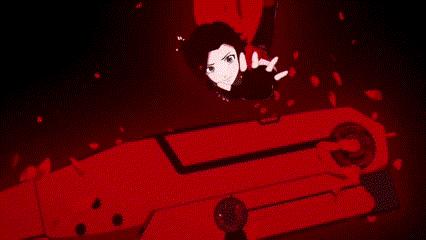
The Red Like Roses trilogy explores Ruby's feelings over Summer, as she sings to her mother. In particular, the red like roses motif shows the layers and the evolution of Ruby's grief.
Initially, we are simply told that:
Red like roses fills my dreams and brings me to the place you rest.
Red roses remind Ruby of Summer Rose, so she goes to visit her grave:
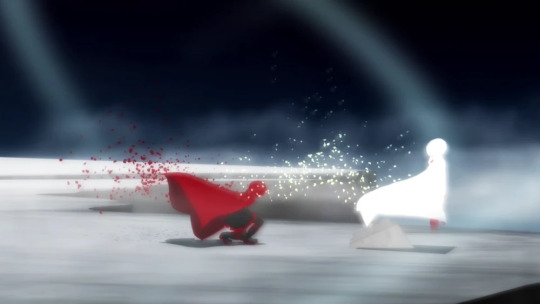
This is the premise of the Red Trailer, but no other indication is given. This fits Red Like Roses being about RWBY as a team, which mirrors Ruby's tendency to carry others' burdens and to repress her own.
However, Red Like Roses Part II reveals Ruby's reaction to Summer's disappearance is raw and complicated:
Both voices: It doesn't matter how
The petals scatter now
Every nightmare just discloses
It's your blood that's red like roses
Voice 1: And no matter what I do
Nothing ever takes the place of you
It is Summer's blood, that's red like roses. So, Summer becomes linked to violence and death. However, Ruby refuses to face these dark emotions. It is this hidden trauma, which leads to Ruby's spiral and breakdown in volume 9. Here is where Guide My Way starts:
Saw you
In a dream
Are you who you seem?
Was it always in the cards for me
To be aimless?
No direction, nothing pulling me down
From the sky it seems like I always get too
High
Oh the air is cold, I don't know how to breathe
I'm begging, can you
Guide my way out
Of this place?
Ruby is aimless and there is nothing pulling her down. This choice of words is interesting because they tie into the gravity imagery, which fills the Atlas Arc:
Keep dreaming 'bout a better world
You keep wishing for some clarity
Always hoping that a lightning bolt
Is gonna save you from this gravity
Gravity is linked to limitations. It is something that chains and makes people fall. People like Ironwood, for example, who is crushed by this force together with his kingdom. And yet, Ruby is designed as a person able to defy gravity. As a matter of fact Petal Burst lets her basically move unbounded by the laws of physics:
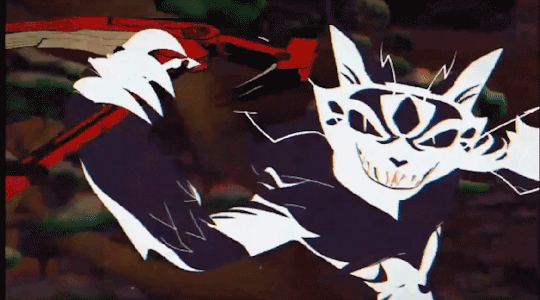
And yet, this freedom slowly becomes a burden. Ruby is never tied down by bad things. She can inspire everyone. She can guide everyone. She always flies higher than everyone. And yet, this in itself is a problem:
Past Ruby: That’s right! It’s up to you to make things better, isn’t it? Everything all depends on you! Your sister needs you, your friends need you, the whole world needs you to keep fighting, forever and ever, against an invincible monster that took your mother!
Ruby is so above everyone else that she finds herself lonely and lost:
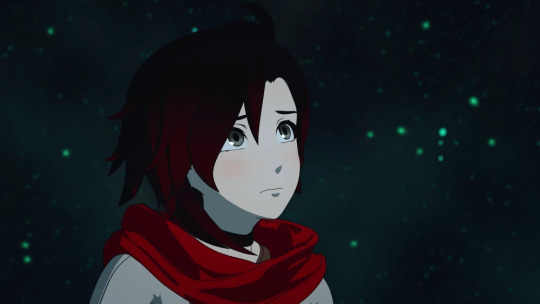
She drinks the tea and ends up in a strange dimension, where she has to choose alone who she is going to be. In this dream world, she meets the person who fills her dreams:
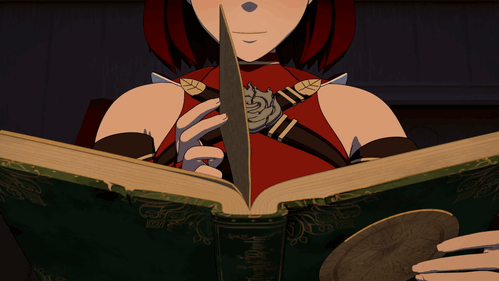
Red like roses fills my dreams
Guide My Way is just a long monologue Ruby tells Summer. Basically a prayer:
Open wide
You were born to hypnotize them all
They said their prayers
(Can you, can you) can you hear me up there?
Through this one-sided confrontation Ruby affirms herself as a person still strongly defined by her mother:
I can't define
Would it even be enough to change my mind?
Your memory ever-lasting at war with my foolish pride
What is left?
I know it's you and I, when I look inside
And yet, a different individual, as well:
I'll be who you were and I'll be even more
She is still incomplete:
Otherside,
Did you mean to make me half or whole?
Will I ever be (complete)?
When will I become all of me?
And yet, she realizes Summer may not be complete herself:
What survives
After all the dust has gone?
Were you there till the end (the end)?
Were you at least called a friend?
Ruby doubts her mother for the first time. Was she at least able to be herself until the end? Like Penny, who was at least called a friend? Or did Summer become her own antithesis?
Who is Summer Rose?
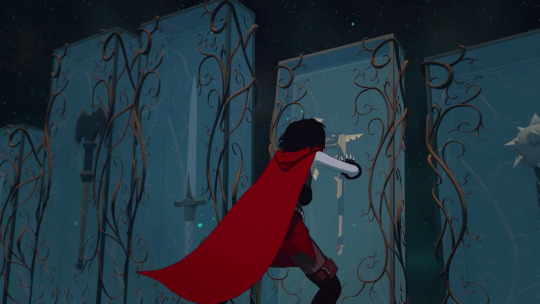
A broken pedestal.
And who is Ruby Rose?
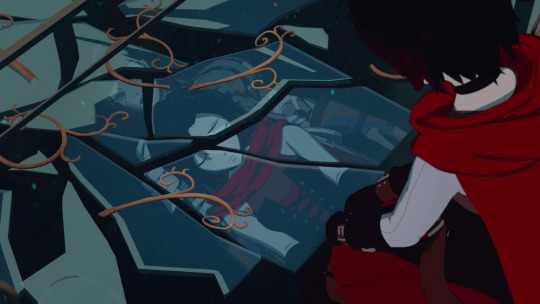
A shattered mirror.
Or is she?
A moment of quiet is all it takes
To reclaim a life and a promise made
Just like Jaune, Ruby only needs a moment of quiet to realize who she is supposed to become:
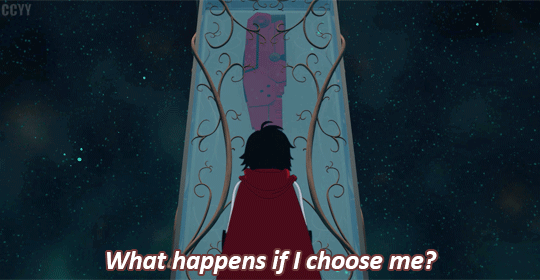
I am the reflection of who prevails
I'm what inspired the fairytale
Her own reflection prevails on Summer's one. In the beginning, Ruby wants to be like Summer, that she equals to the fairy tale heroes her mom reads her about:
Ruby: I love books. Yang used to read to me every night before bed. Stories of heroes and monsters… They're one of the reasons I want to be a Huntress!
Still, Ruby is the one who will make the fairty tale into reality:
Blake: The real world isn't the same as a fairy tale.
Ruby: Well, that's why we're here! To make it better.
As a result, she doesn't need fairy tale heroes anymore. Rather, she is going to inspire fairy-tales. Actually, she has already inspired one:
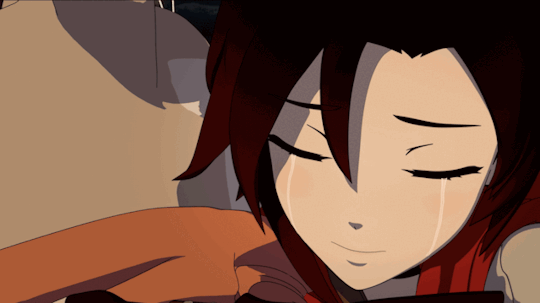
She inspires Little to grow into Somewhat. She helps a literally fairy-tale character. She is the childhood hero (Huntress) to Little. Just like Summer is Ruby's childhood hero:
Somewhat: You do feel… familiar. Like a happy dream I can’t remember.
Ruby is a happy dream Somewhat can't remember. Summer is a happy dream Ruby can't remember. This is why in Red Like Roses Part III there is simply:
Red like roses fills my dream
Red like roses here is not linked to death (it doesn't bring Ruby to the place Summer rests) or violence (it isn't Summer's blood that's red like roses). It is simply Summer's color, which fills Ruby's happy dreams. Even if she can barely remember Summer, she still loves her. Not as a hero, but as a mother:
Summer: I love you… just the way you are. Always…
At the same time, Ruby herself becomes someone else's dream. Specifically, she becomes the dream of her inner child (Little). She doesn't need to idealize Summer anymore because she is growing to be her own hero. She is going to take care of her inner child in Summer's place. This is what it means to become an adult.
This is what the refrain of the song hints at. It starts with Ruby begging Summer, but then it slowly changes through the song, until it reaches its powerful ending:
I'm begging, can you
Guide my way out
Of this place?
Guide my way out
Of this place
Guide my way out
Of this place
(I can guide me, I can guide my way out)
Guide my way out
Of this place
Ruby herself can guide her way out.
OTHER SONGS
Here comes some quick miscellania thoughts on other tracks.
Chatterbox: I love how it plays when the Jabberwalker appears and it is impossible to understand who is singing. It is a beautiful nod to Carol's original non-sense poem and it ties with the CC and especially Neo's arc
Quiet: The sound of clocks, the reference to Pyrrha and the mention of a miracle as a nod to Jaune's allusion make it a fave. I also love it plays in one of my favourite scenes of the seasons.
Worthy: I like it musically and I love how it describes Blake and Yang's relationship through the metaphor of falling, which calls back to the episode Worthy itself.
Checkmate: It is one of my favourite musically, but I don't have much to say about its lyrics. I think it beautifully introduces the viewers to the season and it calls back to player and pieces in many ways. It also references the chess motif throughout the series.
Inside: I love how its lyrics reference the Blacksmith's speech about living with Balance and beautifully illustrate the theme of the season.
Trapdoor: I like it musically, but I have not much to say about its lyrics. I think it is kind of self-explanatory as a song.
The Edge: My least favourite track. It is good enough, but not my piece of cake.
Thank you for the ask and have a nice day!
#rwby#rwby volume 9#rwby meta#greenlight volume 10#ruby rose#summer rose#my meta#rwby soundtrack#selenestarmoon#asksfullofsugar
36 notes
·
View notes
Note
Hey, so I saw your post about some fics demonizing Neytiri. That has actually been one of my major fears as a fic writer, attempting to balance Neytiri's extremely valid trauma and the POV I'm writing from (that is typically flawed in some way). I was wondering, since you seem very well-versed on the topic, what do you define as "demonizing" for Neytiri? Is it ok to write from a perspective where a character doesn't really like or trust her, as long as the trauma is noted? Do you have any resources so I can educate myself to properly write this kind of character?
I really want to make sure I'm doing right by Neytiri and improve as a fic writer overall, so any advice you could offer would be very much appreciated!
Whoa, what a complicated and nuanced question. A great one! And I'm super flattered you came to me! Just one I'm going to try to answer to the best of my ability. I'm assuming you're referring to Norm's pov in your fic?
First of all, I do not want to at all proclaim to be an expert on generational trauma; I am not a person of color, and I have been lucky enough to have a very normal and healthy family. I just had a best friend growing up in an abusive household and took steps to educate myself best I could to understand the situation, which I believe anyone would do. So I'm just gonna try to word vomit out my thoughts for you, please ask questions or challenge any of what I say if any of you see anything you think is incorrect. Buckle in, this will be long.
What do you define as "demonizing" for Neytiri?
Demonizing means portraying someone as wicked or threatening, as evil or worthy of contempt and blame.
For me, demonizing for Neytiri is the trend I've seen lately of portraying her as this unyielding, animalistic type character who's hatred of humans, Spider specifically, goes so far that she gets physically violent with Spider and eventually ends up tearing apart her family. In these fics, Jake is always a sad sack loser bystander, loving his wife too much to step in but of course shamefully knowing how wrong what she's doing is. Infantilizing poor white savior Jake Sully, being brow beaten by his mean indigenous wife into neglecting a child is a weirdly strong take in this fandom. Often Mo'at is a wise elder chiding Neytiri for being unable to get over her prejudice. Mo'at and Jake understand Neytiri as much as anyone would, they wouldn't shame her. To me, it's an extremely reductive and frankly borderline racist characterization. When paired with a sympathetic view of Quaritch, it is at best irresponsible and at worst knowingly dangerous.
Neytiri is representative of an indigenous woman. I feel like I don't have to explain why making her violent, volatile, and completely unreasonable is a little bit of a harmful caricature. In these fics, for me, Neytiri ceases to be a person. She looses autonomy to sort of represent this monolith of hatred and prejudice that has hurt our little baby boy Spider. It's crazy to me that people can't apply the exact same empathy they have towards Spider (saving Quaritch) to Neytiri (not being able to trust Spider). They are the most foil of foil characters. Their storylines are extremely similar, if I'm being honest. Essentially, ignoring the fact that Neytiri is a member of a minority community being actively genocided by Spider's people is intentionally reductive. If you can empathize with Spider, and ESPECIALLY if you find Quaritch sympathetic, finding Neytiri's actions unforgivable is racism, plain and simple.
Also, side note, the lengths people go to where Neytiri just literally will not budge under any circumstances at all is INSANE.
(I read a fic the other day where she gave Spider to child protective services behind everyone's back. That's LUNACY. She only came around after she almost lost Tuk when Tuk was suddenly born prematurely and Mo'at came in and was like "Eywa made it so you can never have kids again because of what you did, have you learned your lesson yet?" Like?? I do not understand the HATRED some of ya'll have for her, the suffering you all think she deserves. She's having an EXTREMELY NORMAL trauma reaction to surviving GENOCIDE? Examine yourselves greatly).
But where I was going was Neytiri is the same character who pushed her parents to let them go to human school, fell in love with human Jake, defended him and trusted him despite her family, mated with him and lost her religious position because of it, and then had a bunch of part human kids with him, and adopted a fully freak of nature kid born of a human she loved and respected. She has human friends, she wears and uses human tech, and she forgave Jake after he had betrayed them. Basically what I'm saying is Neytiri, despite her continuous trauma, is the most open and curious and non traditional Na'vi of all time. Girl is READY to meet new people and learn new shit, and to be open to everyone. Sometimes I think about a no trauma Neytiri and I get emotional. I think it's crazy to say she would never budge on Spider, if it wasn't for his dad I'm pretty sure she would've softened lonnnnng ago, if not having liked him from the get go.
Um, that got way too long I have too many thoughts. Second half of your question.
Is it ok to write from a perspective where a character doesn't really like or trust her, as long as the trauma is noted?
This is a tricky question, because technically there is nothing you can't do as a writer. Of course, it also means there is nothing anyone can't criticize you for writing. Like, Colleen Hoover can say she's writing realistic depictions of domestic abuse until the cows come home, I'm still going to say she's romanticizing and normalizing it in a super callous way. Neither of us can stop the other. So yeah, of course you're okay to write from the perspective of a character that doesn't like Neytiri. I just think the point will be what your prerogative is. One of my MFA professors says it in a way I like and I'm sure I've referenced before, if you aren't trying to make a point about something that might have to have a trigger warning then don't include it. I always say I would take it a step further; if your point is to defend that thing, don't do it. So for me, my big points would be try not to project my own feelings onto the character either way; if the character is wrong about something and the narrative intends to show that they will either learn, or we the reader will grow past them. But to be sure what you feel the takeway of the piece is is what you wanted it to be, I guess.
Do you have any resources so I can educate myself to properly write this kind of character?
Well, I have a few on white writers writing BIPOC characters and the ethics of that if you're interested in that. But I don't have any on specifically writing generational trauma. I guess I'd say reading and absorbing are my biggest tools; so reading books/watching movies or TV that use the speculative to translate generational trauma, and learning about and taking in the real life examples the character is based on. Read up on some genocides, and indigenous people today and how their lives are still affected. Even just watch the news; we're witnessing a very public genocide being pushed right to our attention right now. And of course, that is not the only genocide happening rn, it's just the only one we're talking about, so there's plenty of real world case studies unfortunately right in front of us.
#this got way way too long#it's almost midnight and i still have work tomorrow#i was goING to answer a few asks during amazing race tonight and instead#just this#lol#my bad#hope this helps! feel free to ask or dm with any questions or grievances haha#keep in mind i am not an expert!#i am just someone who likes knowing things and is really annoying about consuming ethically#anyways spider fandom i need u to lay off my girl#fandom criticism of bipoc characters is somehow always a little rooted in racism#but that's because we've all got internalized racism my friends and we cannot escape it without daily intentional thought and conversation#neytiri sully#miles spider socorro#spider socorro#spider sully#jake sully#jeytiri#mo'at#miles quaritch#tuktirey sully#norm spellman#avatar#avatar the way of water#james cameron avatar#melissa og#melissa on avatar (cameron)#melissa is an english major
40 notes
·
View notes